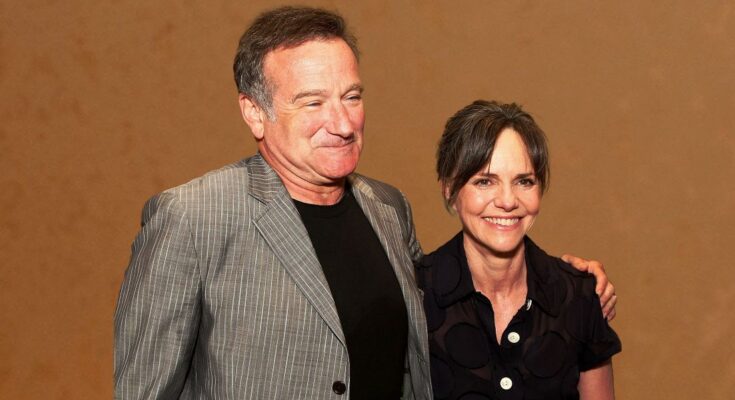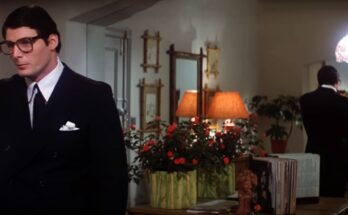From adjusting the “Mrs. Doubtfire” filming schedule to support Sally Field’s grief, to lifting Steven Spielberg’s spirits in dark times, these eight stories showcase Robin Williams’ deep compassion and lasting impact on those around him.
Robin Williams’s legacy as a comedic genius is unquestionable, but beneath the humor was a man of profound empathy. His ability to sense when others were struggling and his willingness to step in with kindness left a lasting impression on everyone he encountered.
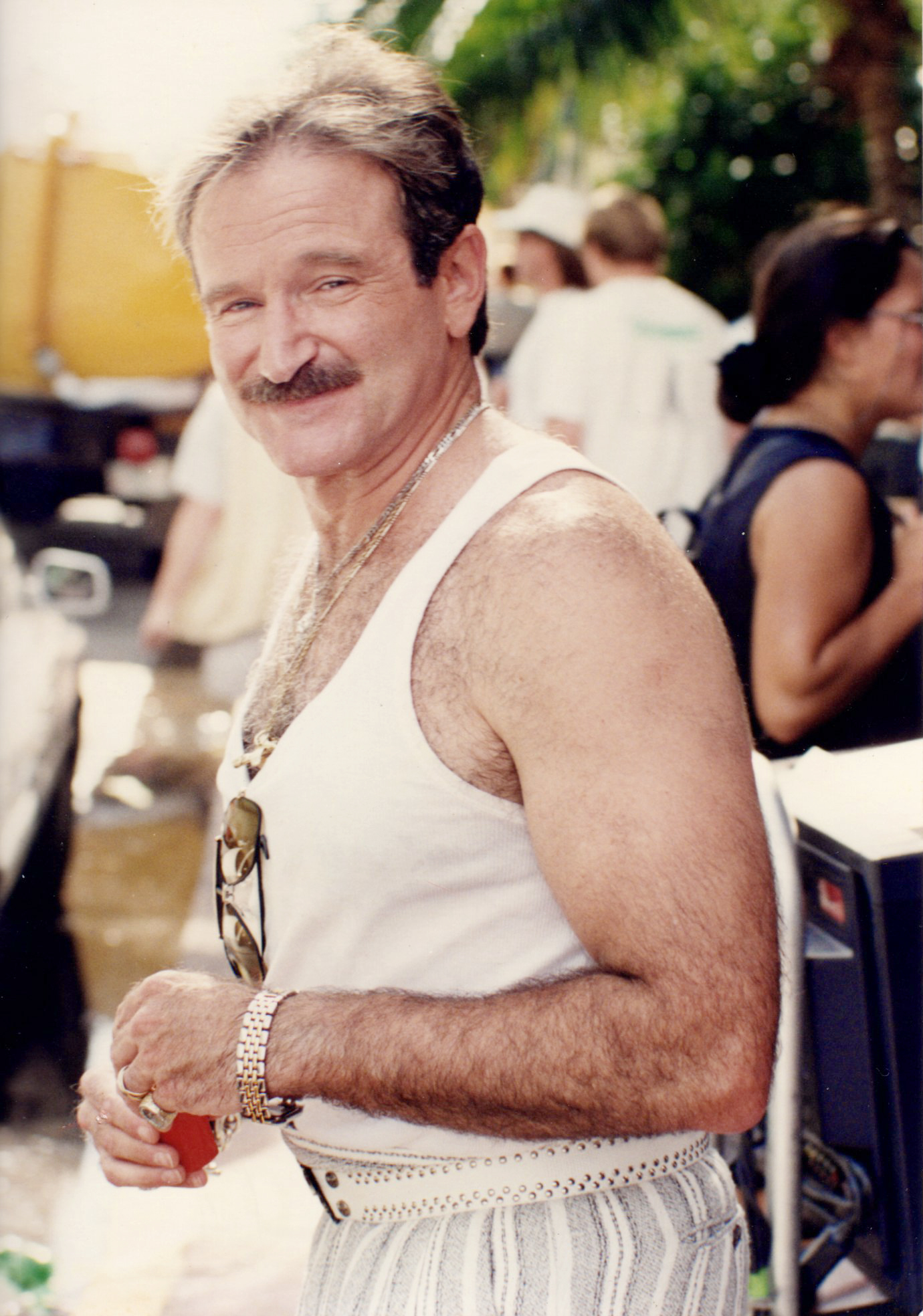
Robin Williams on the set of “The Birdcage” in 1995 in Miami Beach, Florida. | Source: Getty Images
From his support of a grieving Sally Field on the set of “Mrs. Doubtfire” to the phone calls that lifted Steven Spielberg during the filming of “Schindler’s List,” these eight touching stories show a side of Williams that was little-known but deeply felt.
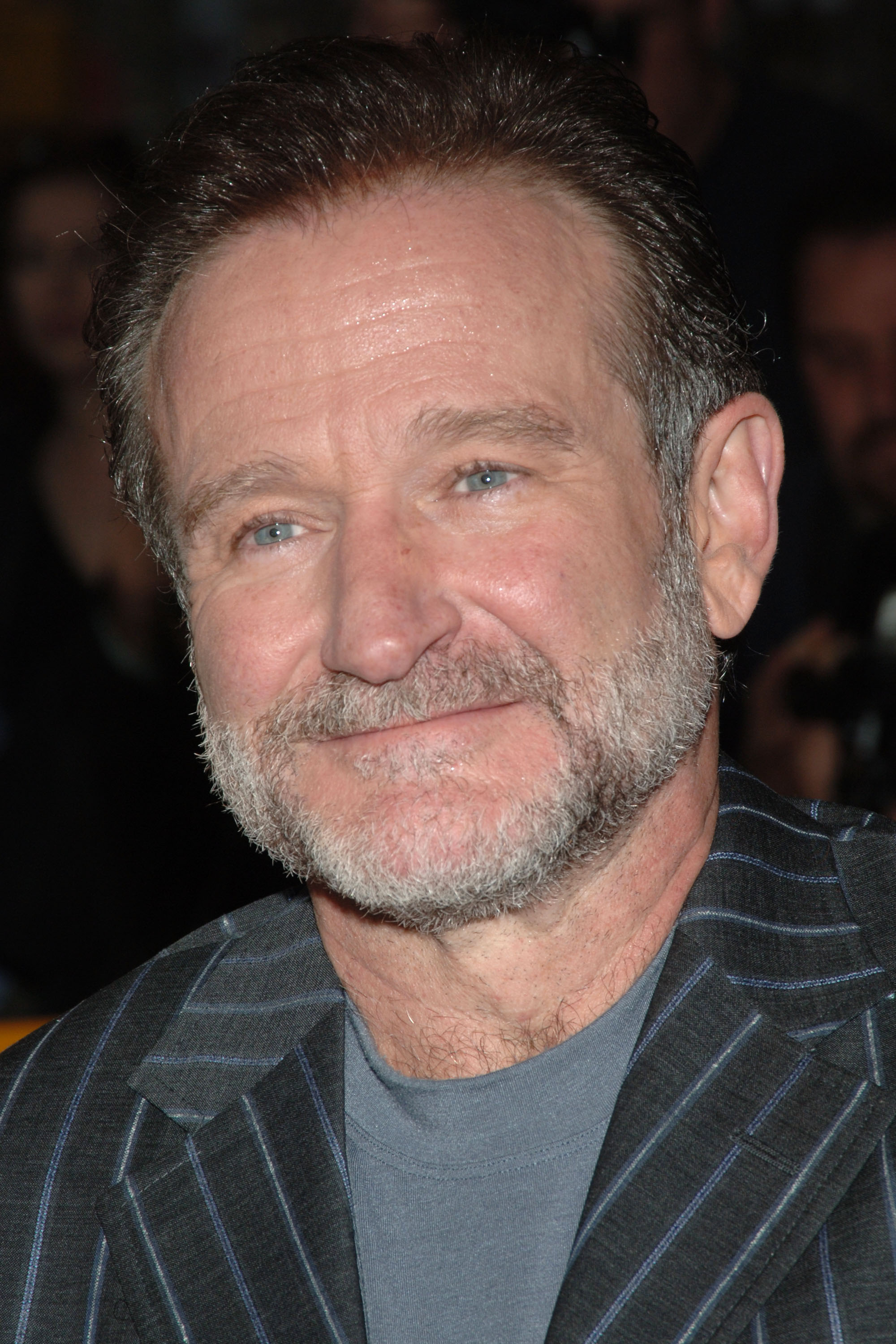
Robin Williams in New York in 2011. | Source: Getty Images
Robin Williams’s Compassionate Response When Sally Field’s World Was Shattered
During the filming of “Mrs. Doubtfire,” Sally Field experienced a deeply emotional moment when she received the heartbreaking news that her father had passed away. He had suffered a stroke a few years earlier and was living in a nursing facility.
The doctor asked if she wanted to put her father on a resuscitator, but Field knew that wasn’t what he wanted. She asked the doctor to let him go peacefully and pass along a final goodbye from her.
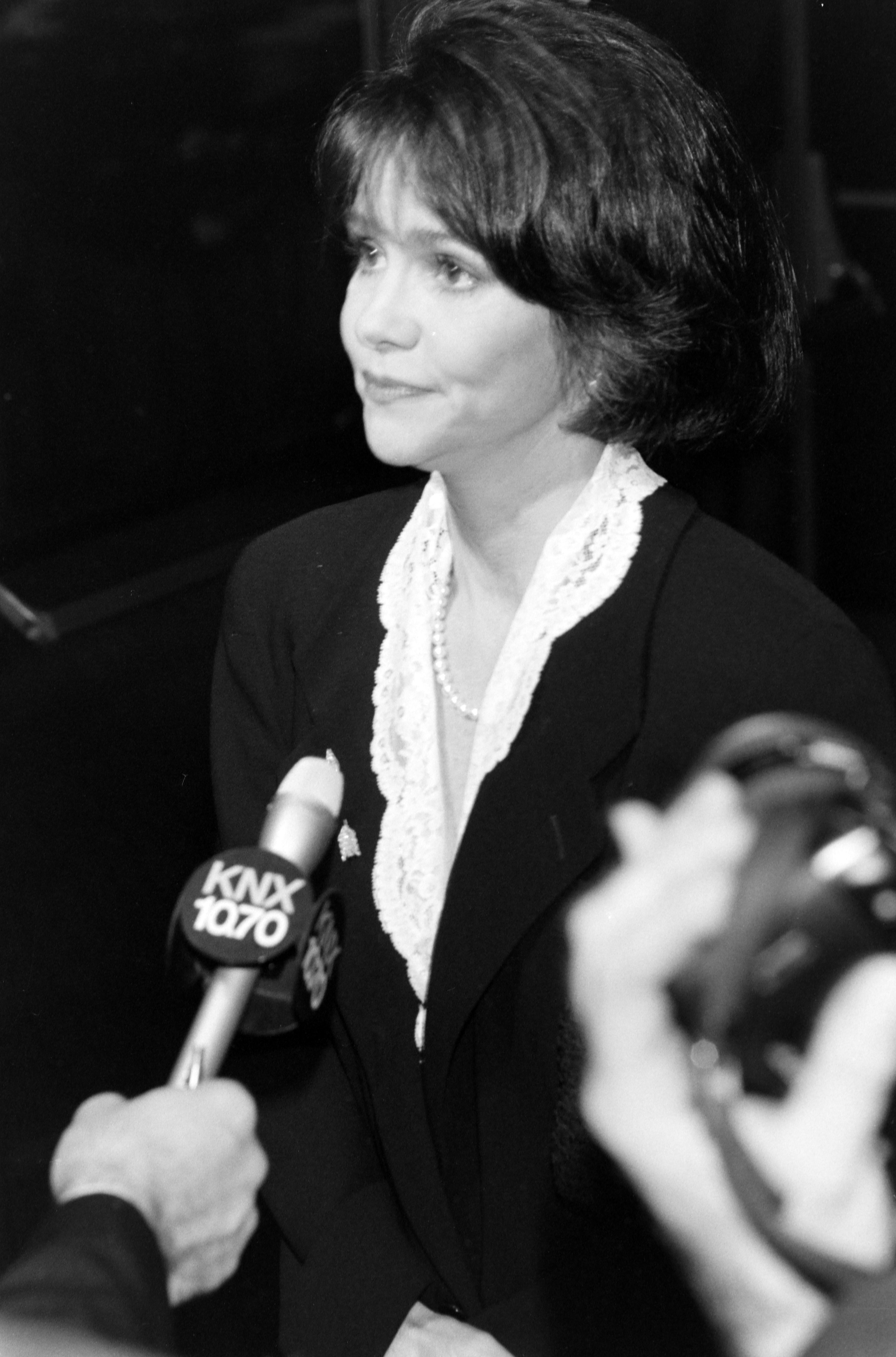
Sally Field at the 1993 AMPAS Gala Celebrating Female Oscar Winners on January 28, 1993 | Source: Getty Images
Devastated by the news, Field tried to continue with the day’s work. They were filming a pivotal scene—the courtroom divorce scene. Even though her heart was breaking, she returned to the set, determined to act as if nothing had happened.
But her emotions were too raw, and she struggled to hold herself together. Williams noticed something was wrong and pulled Field aside to check on her. When he asked if she was okay, Field initially tried to assure him that she was fine.
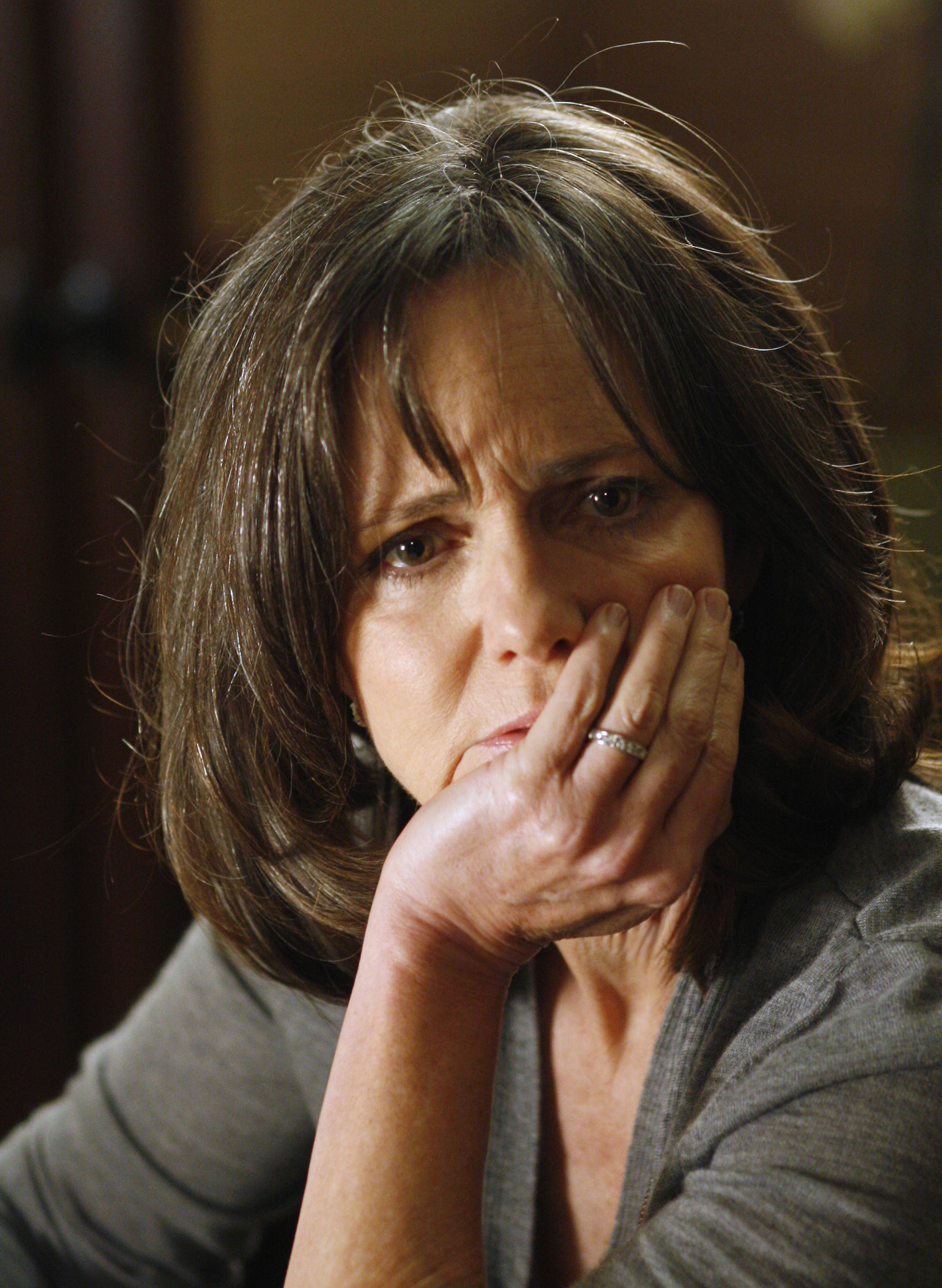
Sally Field filming “Brothers and Sisters” in 2009. | Source: Getty Images
However, her grief was too much to hide and the actress eventually confided in her co-star that her father had just passed away. Williams’ response was immediate and compassionate. He insisted that Field should not continue working under such emotional distress.
Understanding the gravity of the situation, he made sure the production adjusted the schedule, allowing Field to leave the set immediately. They shot around Field for the rest of the day, giving her the time and space she needed to process the loss.
This act of kindness allowed Field to return home, reach out to her brother, and begin arranging her father’s funeral. “It’s a side of Robin that people rarely knew: He was very sensitive and intuitive,” Field shared.
“He was the best. The. Best,” a social media user said of Williams. “That man was a gift to the world,” another person added. A third person commented, “He was one of a kind, I miss him.” “The loss of Robin Williams is impossible to get over. Been gone for almost 10 years. Still hits me,” a fourth typed.
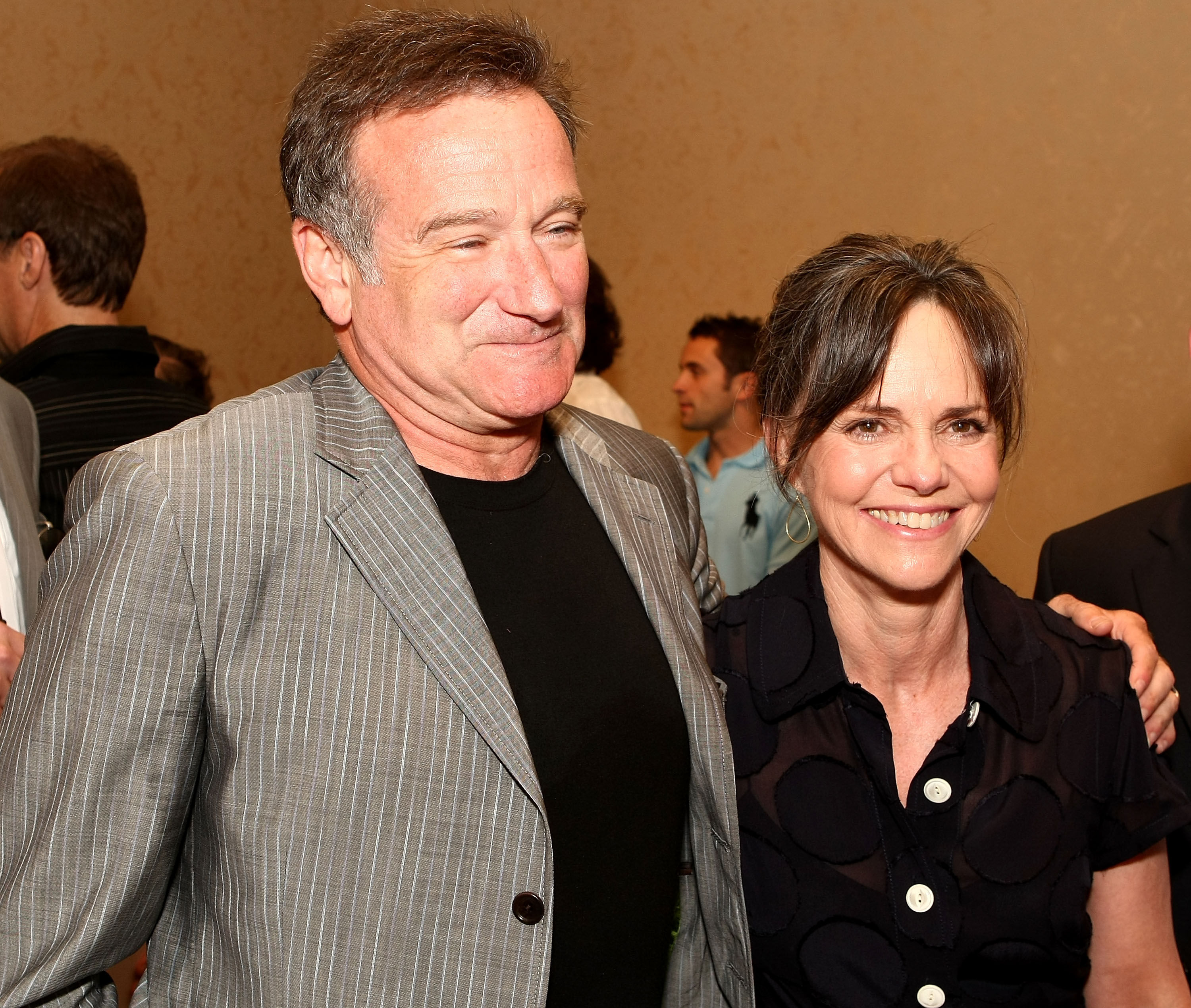
Robin Williams and Sally Field during an event hilightinhg a campaign for a new GI bill on June 22, 2008, in Los Angeles, California | Source: Getty Images
Robin Williams’ Gentle Care for a Grieving Mara Wilson
When Mara Wilson was only nine years old, her mother passed away. Shortly after her mother’s death, she participated in a table read for “What Dreams May Come.” During the reading, Williams, who starred in the film, approached young Wilson with a gentle and quiet demeanor.
He softly inquired about how she and her family were doing, showing genuine concern for her well-being. What stood out most to Wilson was how carefully he handled the conversation — avoiding anything that might have been too painful for her to discuss. “He was just very sweet,” the actress said.
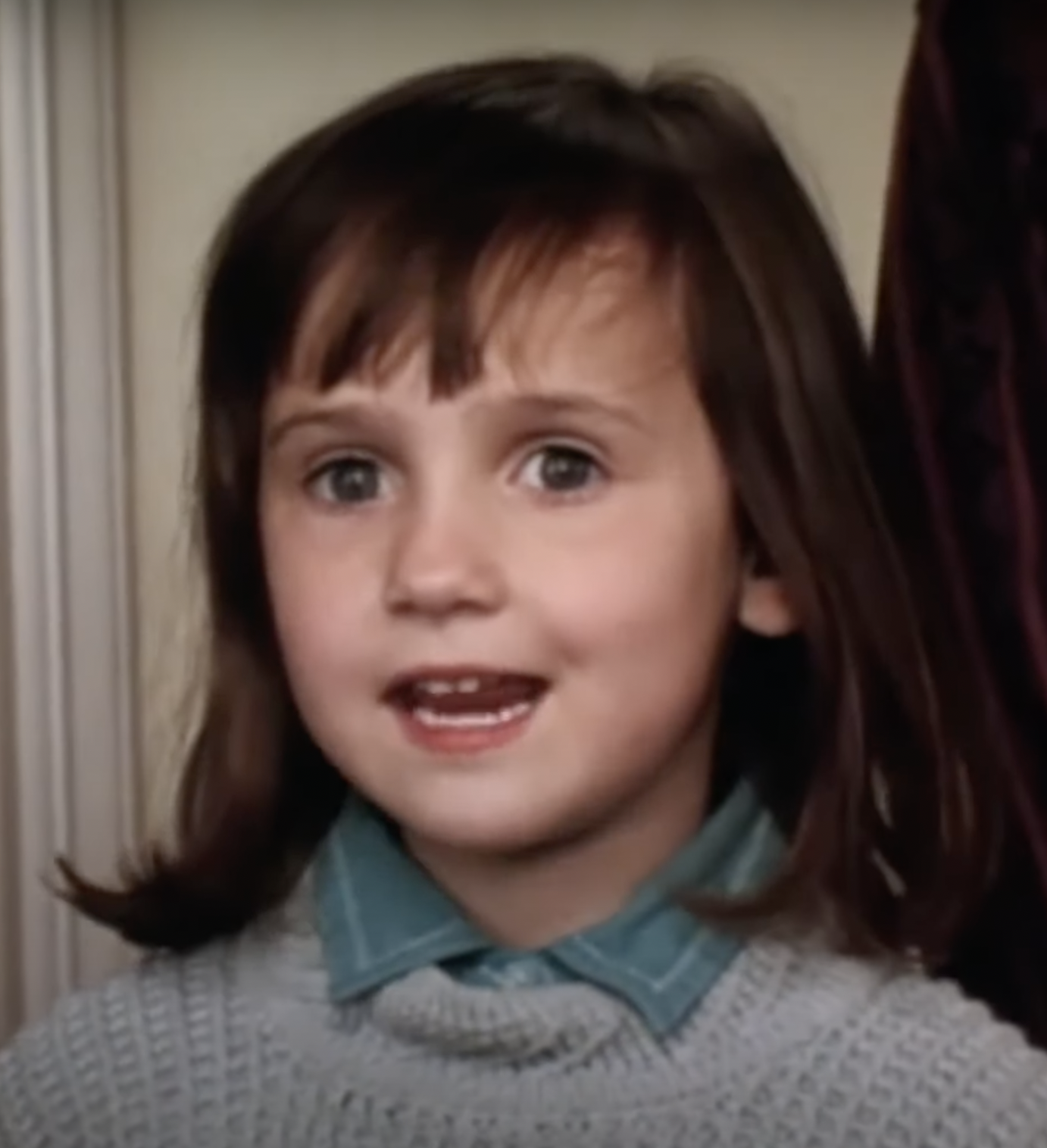
Mara Wilson filming a scene in “Mrs. Doubtfire.” | Source: YouTube/Rotten Tomatoes Classic Trailers
Robin Williams’ Commitment to Uplifting the Homeless
A story shared on social media revealed one of the ways Williams made a difference behind the scenes. In his rider — a list of specific requirements provided to ensure an artist’s needs are met during events or productions — Williams included an unexpected request.
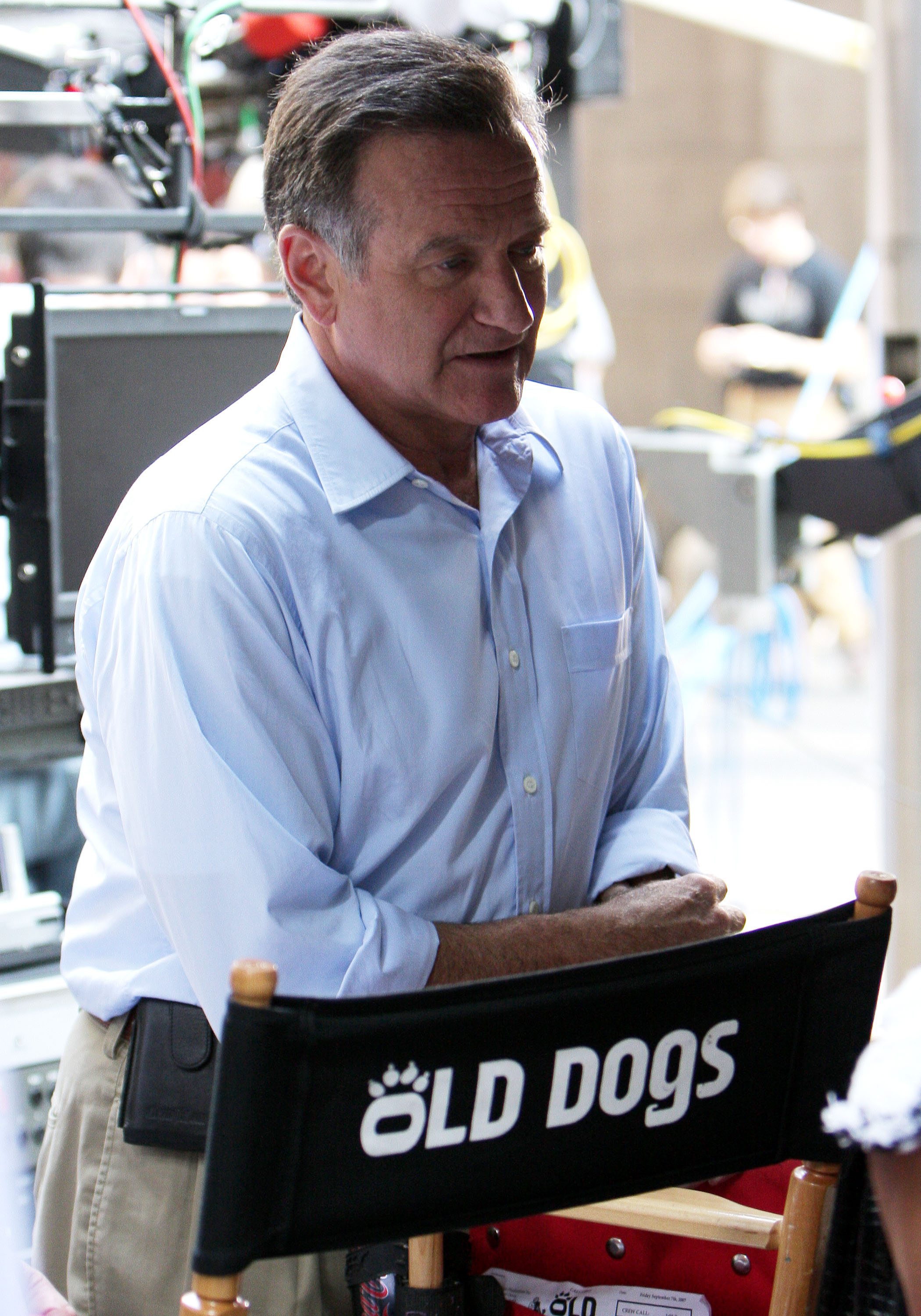
Robin Williams on the set of “Old Dogs” on September 7, 2007, in New York. | Source: Getty Images
Whenever he was hired for a film or event, he insisted that the company also hire a certain number of homeless people and give them jobs. The person who shared this story recalled how this discovery forever changed the way they viewed Williams’ movies.
They admired how Williams not only helped people in need with his own time and resources but also used his influence to encourage production companies and event planners to do the same.
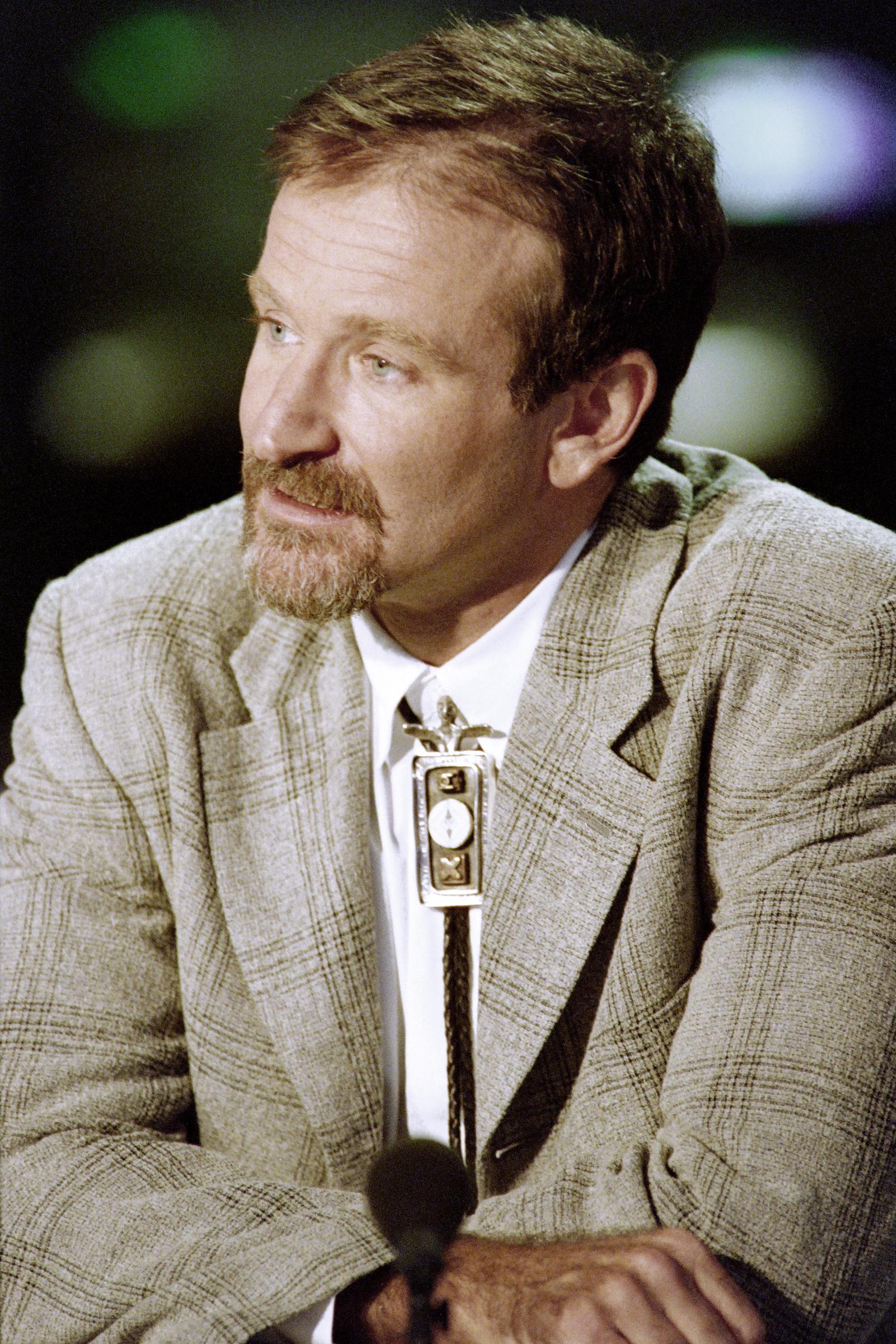
Robin Williams, circa 1994. | Source: Getty Images
“He was a great multiplier of his impact. Let’s hope that impact lives on without him. Thanks, Robin Williams — not just for laughs, but also for a cool example,” the Facebook post concluded.
Robin Williams’ Heartfelt Role as a Secret Santa for Hospitalized Children
Another touching example of Williams’ kind nature was his tradition of volunteering as a Secret Santa at a children’s hospital. Pediatrician Carrie Chen, who did her residency at the University of California-San Francisco, recalled hearing from the nurses that Williams visited the hospital every Christmas Day.
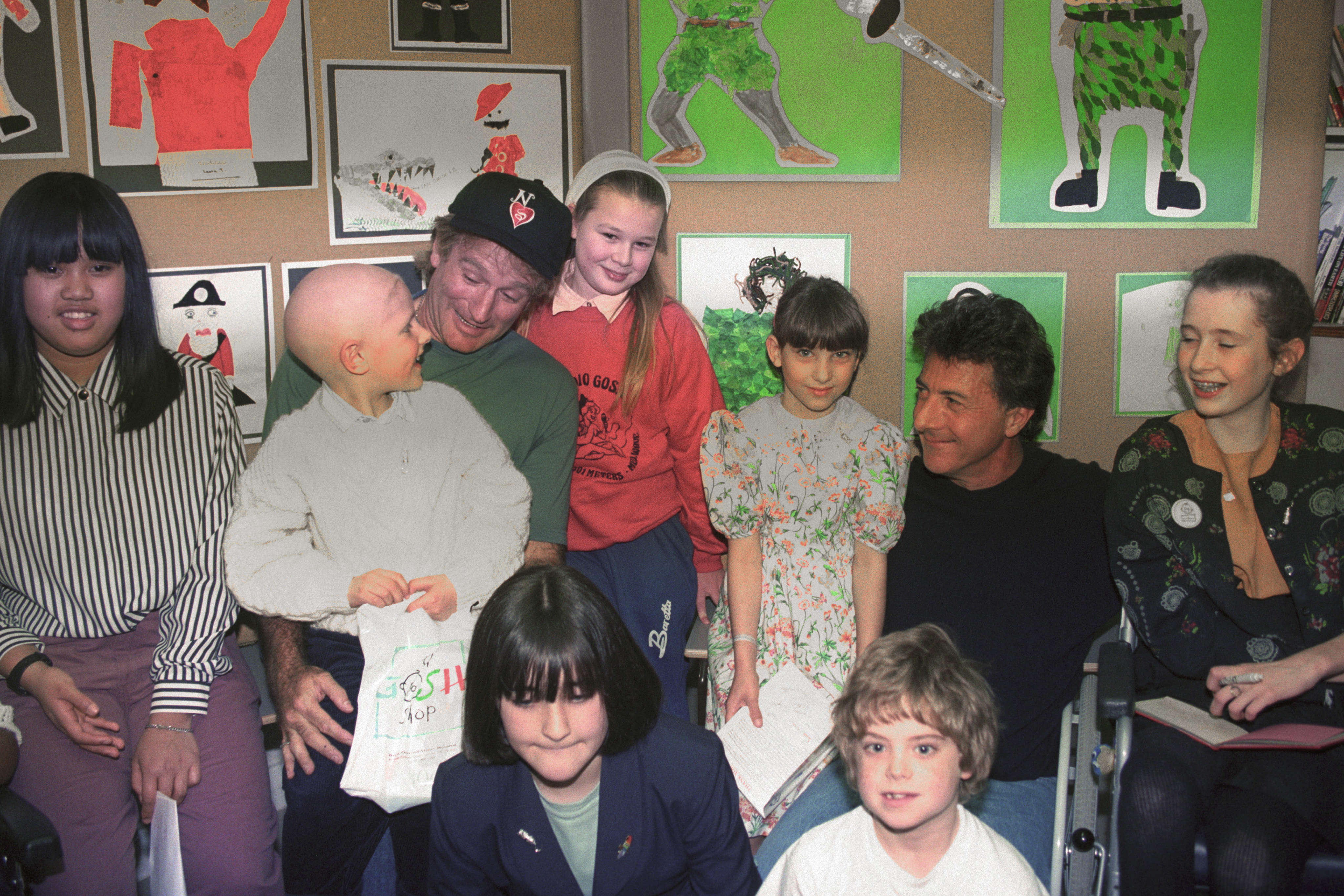
Robin Williams and Dustin Hoffman with some of the children of Great Ormond Street Children’s Hospital during their visit on May 21, 1992, in London, England. | Source: Getty Images
He didn’t announce his visits or seek attention — the actor simply showed up, bringing gifts and cheer to the children who had to spend the holidays in the hospital. Chen vividly recalled Christmas Day in 1998 while working as part of a pediatric team at San Francisco General Hospital
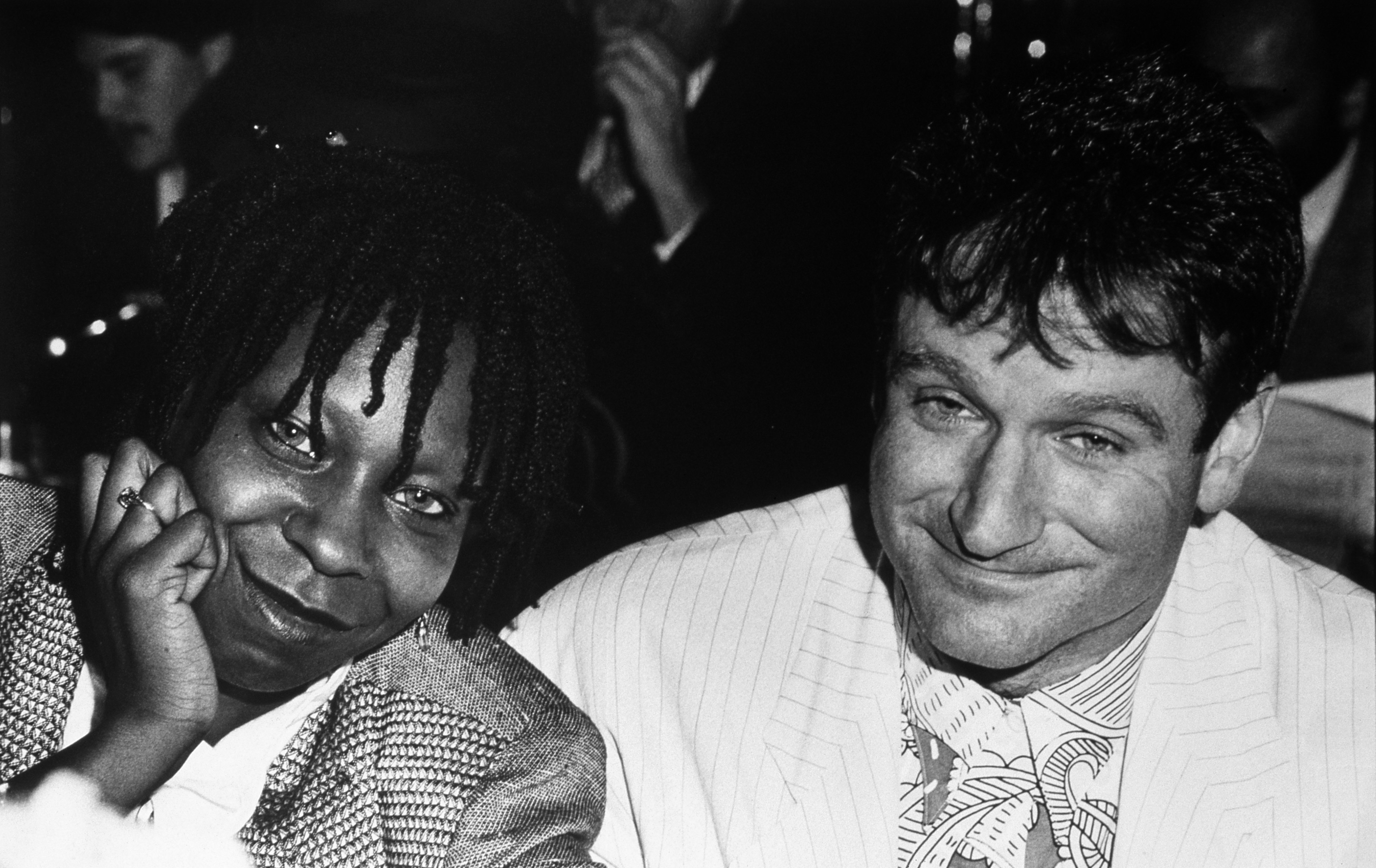
Whoopee Goldberg and Robin Williams at a charity event for Children of the Night in 1994 in Los Angeles, California. | Source: Getty Images
They had just finished stabilizing a premature baby born at 28 weeks when Williams arrived in the pediatric ward, carrying toys for all the young patients. After learning that the doctors had been tending to the premature baby, Williams asked to visit the newborn.
Since the baby was stable, the medical team agreed. When Williams saw the tiny, fragile infant, he was deeply moved. Tears filled his eyes as he thanked each of the doctors for their dedication and care, especially on Christmas Day.
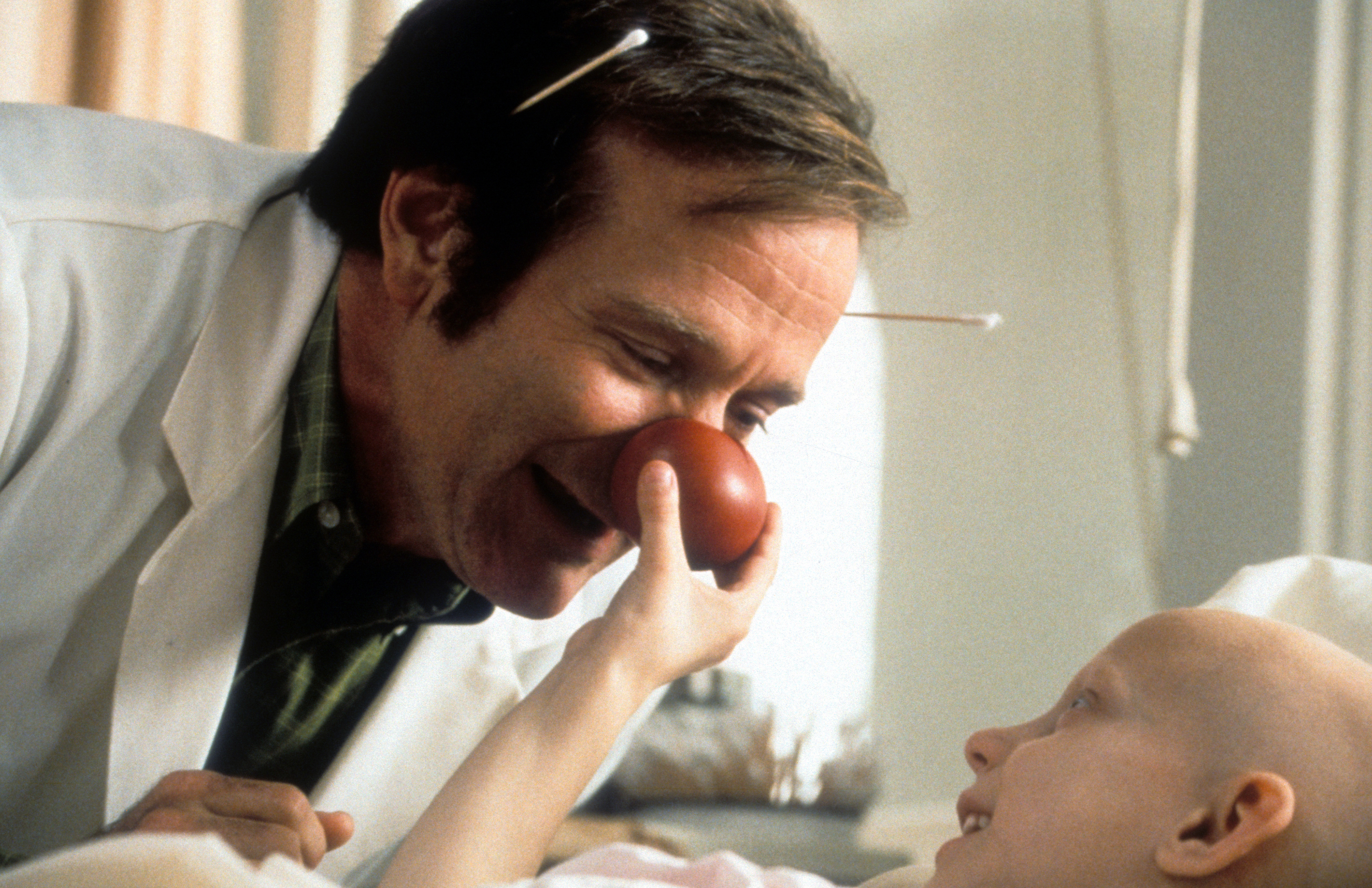
Robin Williams filming a scene from “Patch Adams,” circa 1998. | Source: Getty Images
It was a moment that left a lasting impression on everyone present. Afterward, Williams continued his rounds, handing out gifts to the children in the ward. He didn’t just bring small gifts — he gave each child a brand-new Nintendo video game, a highly sought-after and expensive gift at the time.
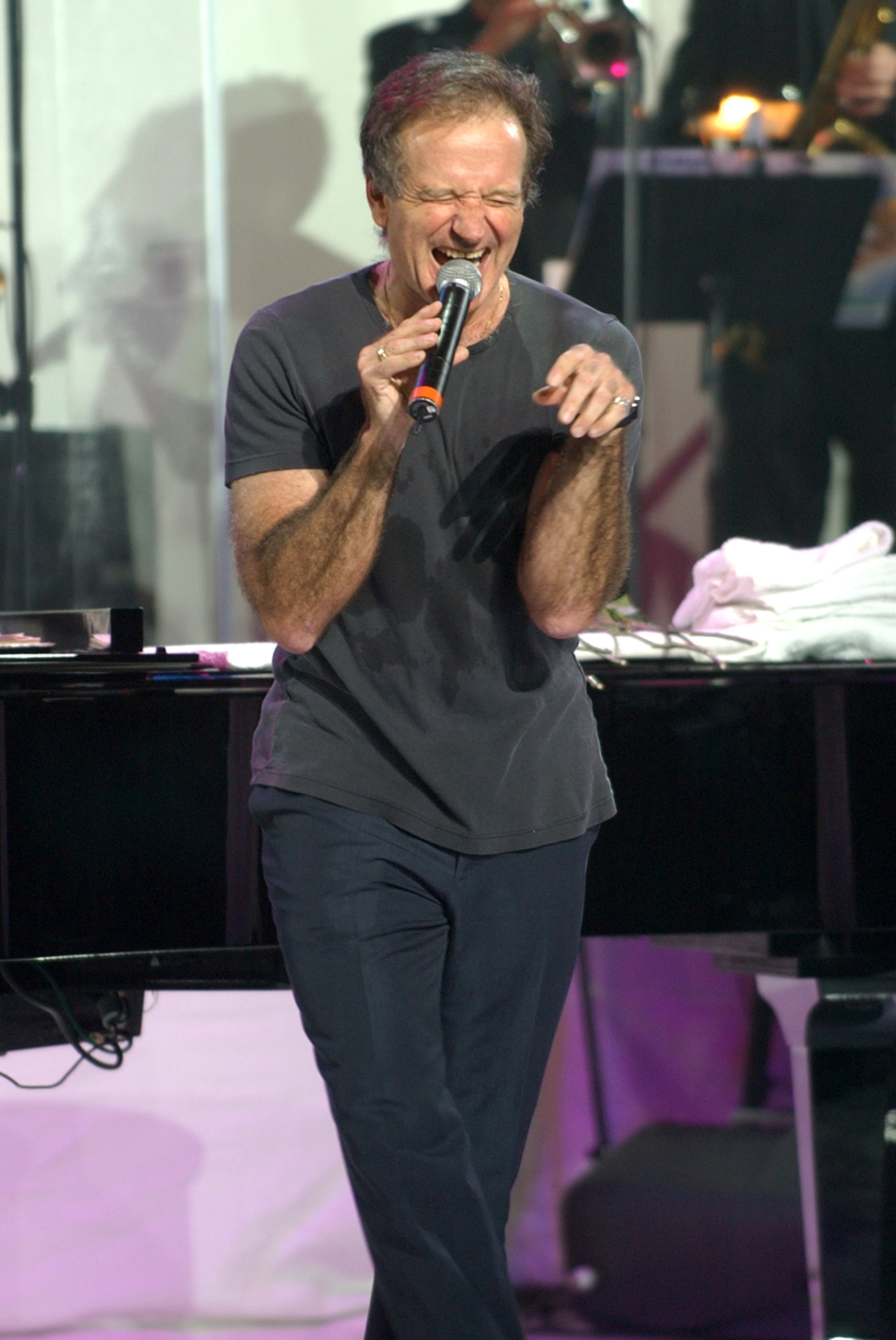
Robin Williams performing during St. Jude Children’s Research Hospital’s “Shower of Stars” 40th Anniversary event on April 26, 2003, in Memphis, Tenessee. | Source: Getty Images
“He didn’t care about the publicity. No one knew he was there, he just slipped in. He just wanted to come and give those children a Christmas present,” Dr. Chen noted. Before his passing, Williams also appeared in commercials for St. Jude Children’s Research Hospital.
Robin Williams’ Late-Night Encounter That Brought Comfort to a Grieving Family
In a story shared on Reddit, a family had just come from a memorial service, where the man’s father had been struggling to cope with the recent, horrific loss of both his parents.
It was around 2:30 in the morning, and the family, still dressed in their formal clothes, was emotionally and physically exhausted. In an attempt to find some small comfort, they decided to visit a local donut shop because the man’s father wanted a donut.
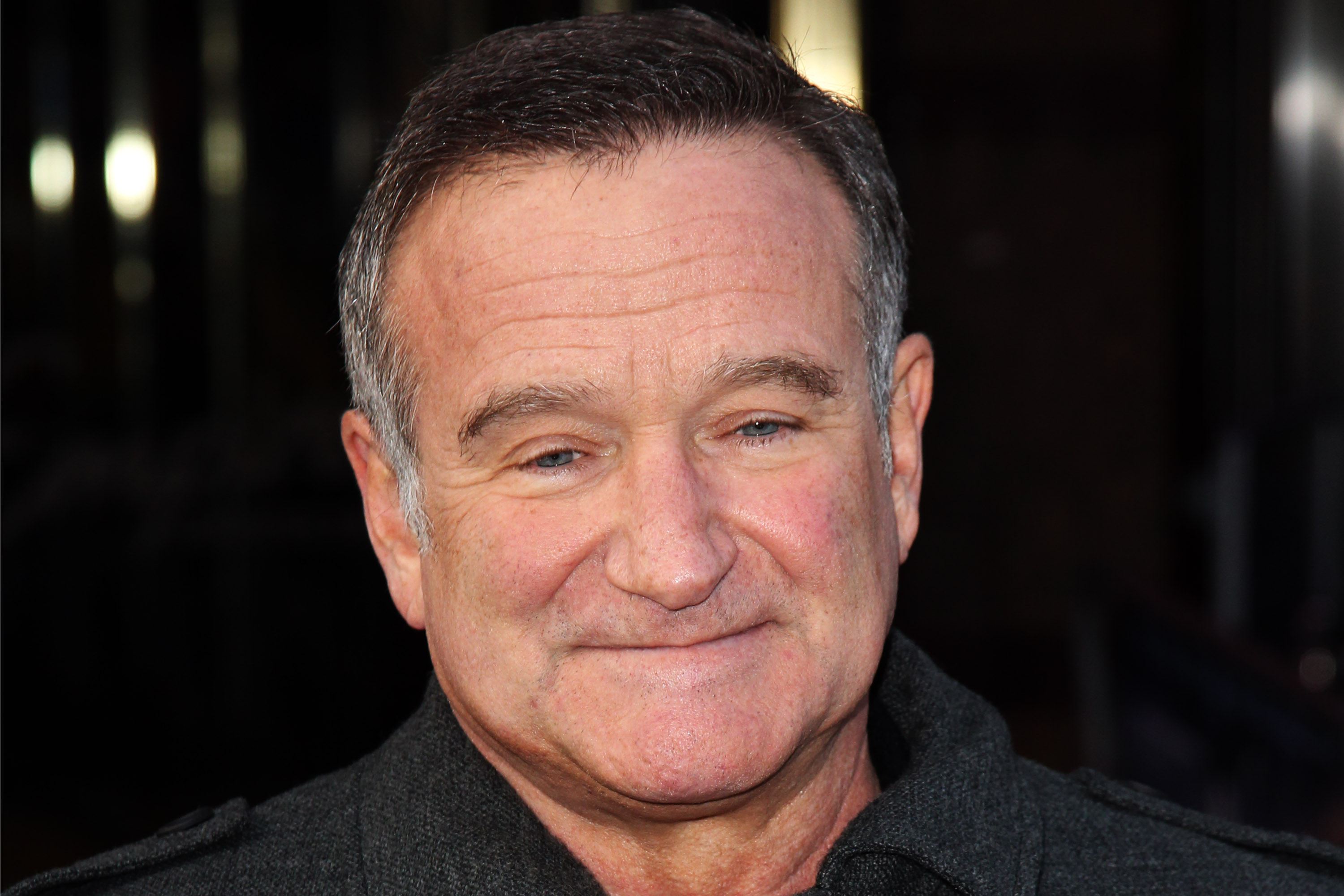
Robin Williams at the premiere of “Happy Feet Two” on November 20, 2011, in London, England. | Source: Getty Images
As fate would have it, Williams was also in the donut shop, quietly enjoying a coffee and a bite to eat. Despite the late hour and the somber atmosphere, Williams noticed the family and instinctively understood that they needed a little cheer.
He chose to engage with them, offering both kindness and humor when they needed it most. The Reddit user recalled how Williams managed to make their parents smile.
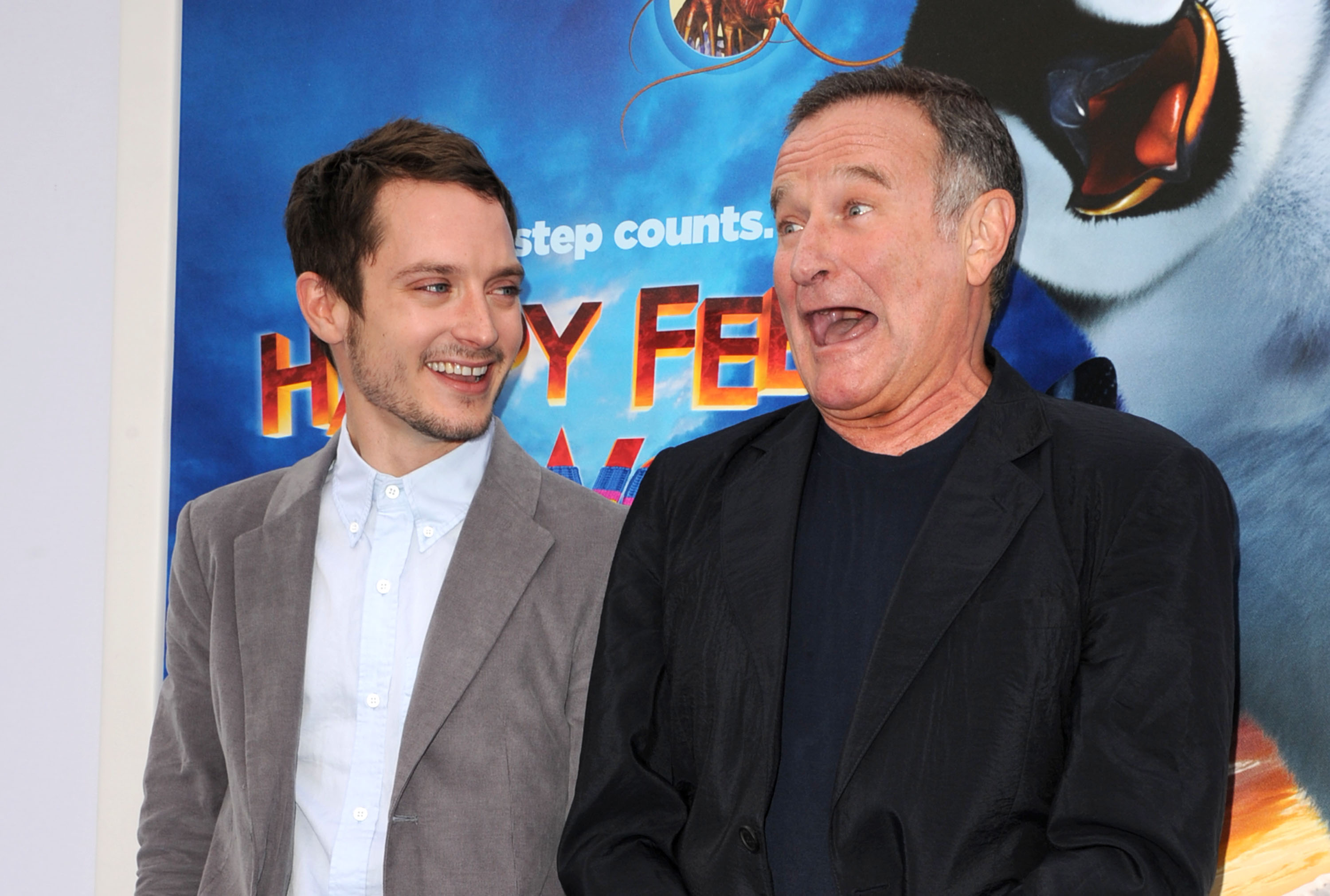
Elijah Wood and Robin Williams at the premiere of “Happy Feet Two” on November 13, 2011, in Hollywood, California. | Source: Getty Images
“I couldn’t tell you what they laughed about, but I remember seeing my parents laugh and smile for the first time in weeks,” the Redditor wrote. The man’s father remembered the encounter fondly, often reflecting on how it was exactly what he needed at that time.
He appreciated that Williams wasn’t trying to be a celebrity or draw attention to himself. Instead, he was simply a kind person who saw a group of sad strangers and decided to make a difference in their night — and in their lives.
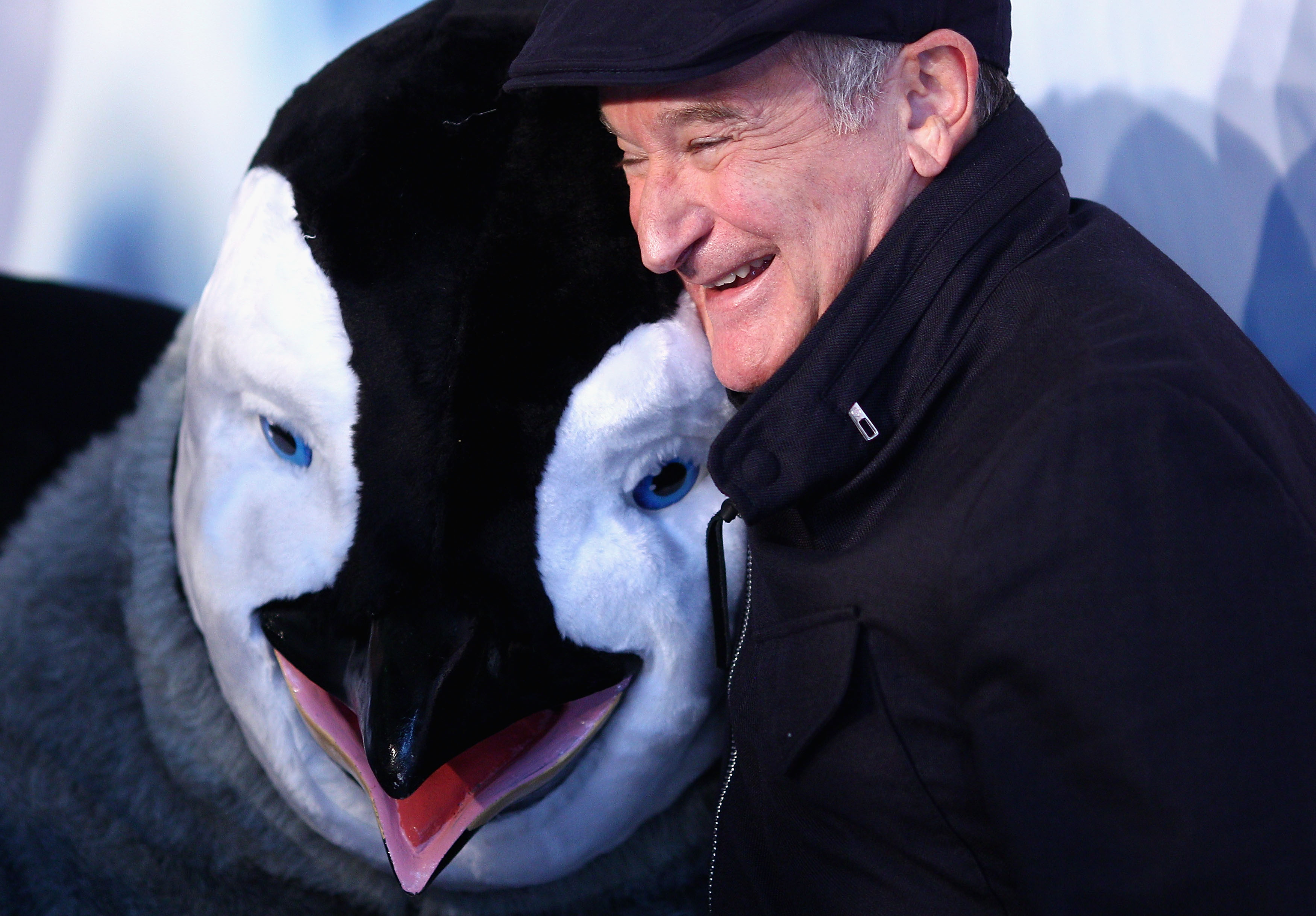
Robin Williams at the “Happy Feet Two” premiere on December 4, 2011, in Sydney, Australia. | Source: Getty Images
Robin Williams’ Remarkable Friendship with a Gorilla
Before his passing, Williams had an extraordinary bond with Koko, a gorilla known for her ability to communicate using American Sign Language. In 2001, the actor visited the Gorilla Foundation in California, where he met Koko for the first time.
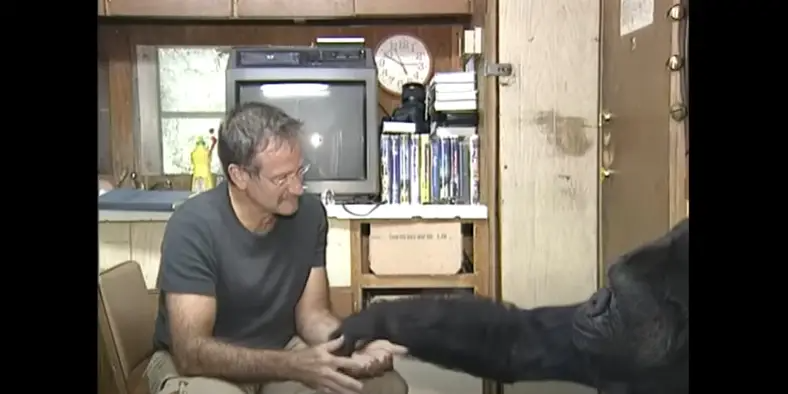
Robin Williams with Koko the gorilla in 2001. | Source: YouTube/kokoflix
The encounter was nothing short of extraordinary. Williams and Koko quickly developed a bond, laughing together, tickling each other, and embracing like long-lost friends.
The warmth and ease of their interaction were evident as Koko, who understood spoken English and used over 1,000 signs to express herself, delighted in Williams’ company.
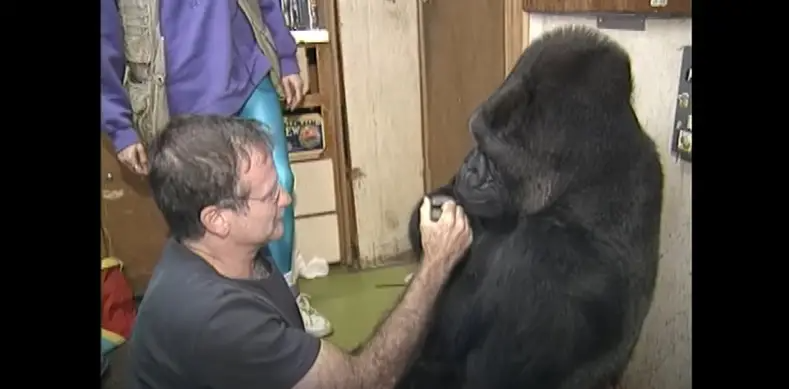
Robin Williams and Koko the gorilla in 2001 | Source: YouTube/kokoflix
Koko felt so comfortable with Williams that she playfully removed his glasses and tried them on. She even reached into his pocket and playfully rifled through his wallet.
Near the end of their visit, Koko gently kissed Williams’s hand and pulled him in for a big hug. This encounter was more than just a playful moment; it was deeply healing for Koko.
At the time, Koko was mourning the loss of her childhood companion, another gorilla named Michael, who had passed away six months earlier. According to Dr. Penny Patterson, Koko’s mentor and surrogate mother, Williams was the first to make Koko smile since Michael’s death.
The impact of their meeting was profound, as it not only lifted Koko’s spirits but also seemed to transform Williams himself. The Gorilla Foundation resurfaced a 2001 video of the meeting between Koko and Williams on YouTube.
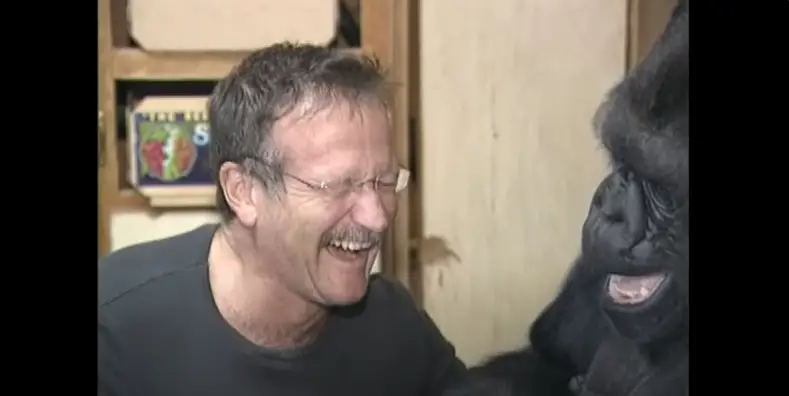
Robin Williams and Koko in 2001 | Source: YouTube/kokoflix
Reflecting on the experience, Williams described it as “mind-altering” and “awesome.” Koko’s reaction to Williams’ death in 2014 further highlighted the depth of their bond.
Upon overhearing Dr. Patterson discussing the news, Koko became visibly saddened, a clear sign of her mourning for the friend who had brought her such joy.
Robin Williams’ Gentle Reassurance to a Fan Who Felt Insecure
Another touching story shared on Reddit highlighted Williams’ kindness and ability to make everyone feel valued. A Reddit user was walking through New York at night and noticed a crowd of people surrounding Robin Williams, eagerly seeking his autograph.
The user joined the crowd, hoping to get something signed but ended up just watching as Williams graciously signed memorabilia and posed for photos with fans of all ages.
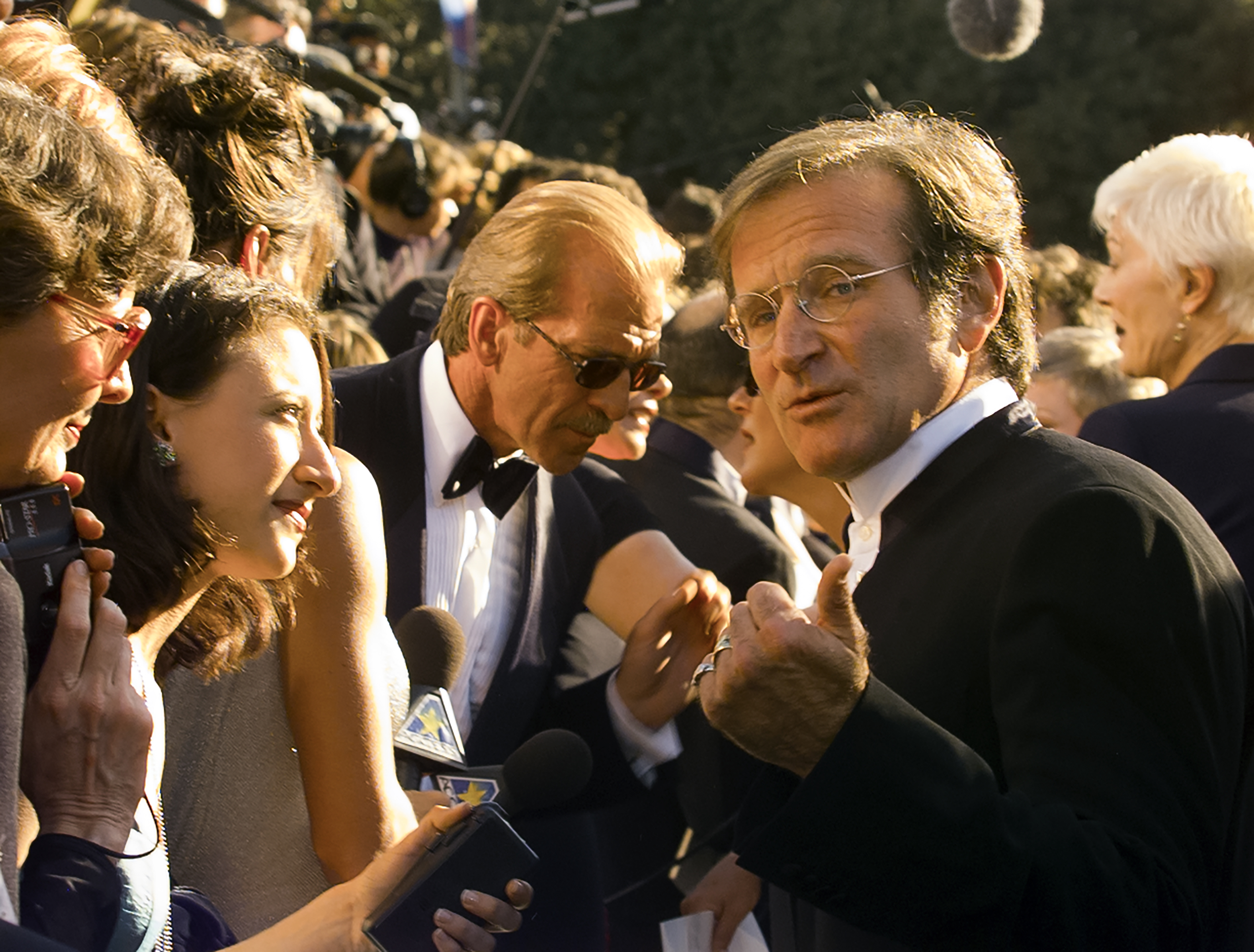
Robin Williams at the Academy Awards on March 23, 1998, in Los Angeles, California. | Source: Getty Images
As the line moved, a man in his 30s, who was slightly overweight, approached Williams with a request that was deeply meaningful to him. The man explained that he had bought and saved a piece of memorabilia for over 20 years, specifically because Robin Williams was his hero.
After Williams signed the item, the man nervously asked if he could also take a picture with him. Williams, always gracious, agreed with a friendly “Sure, boss.” The man, however, hesitated and took a picture of just Williams instead.
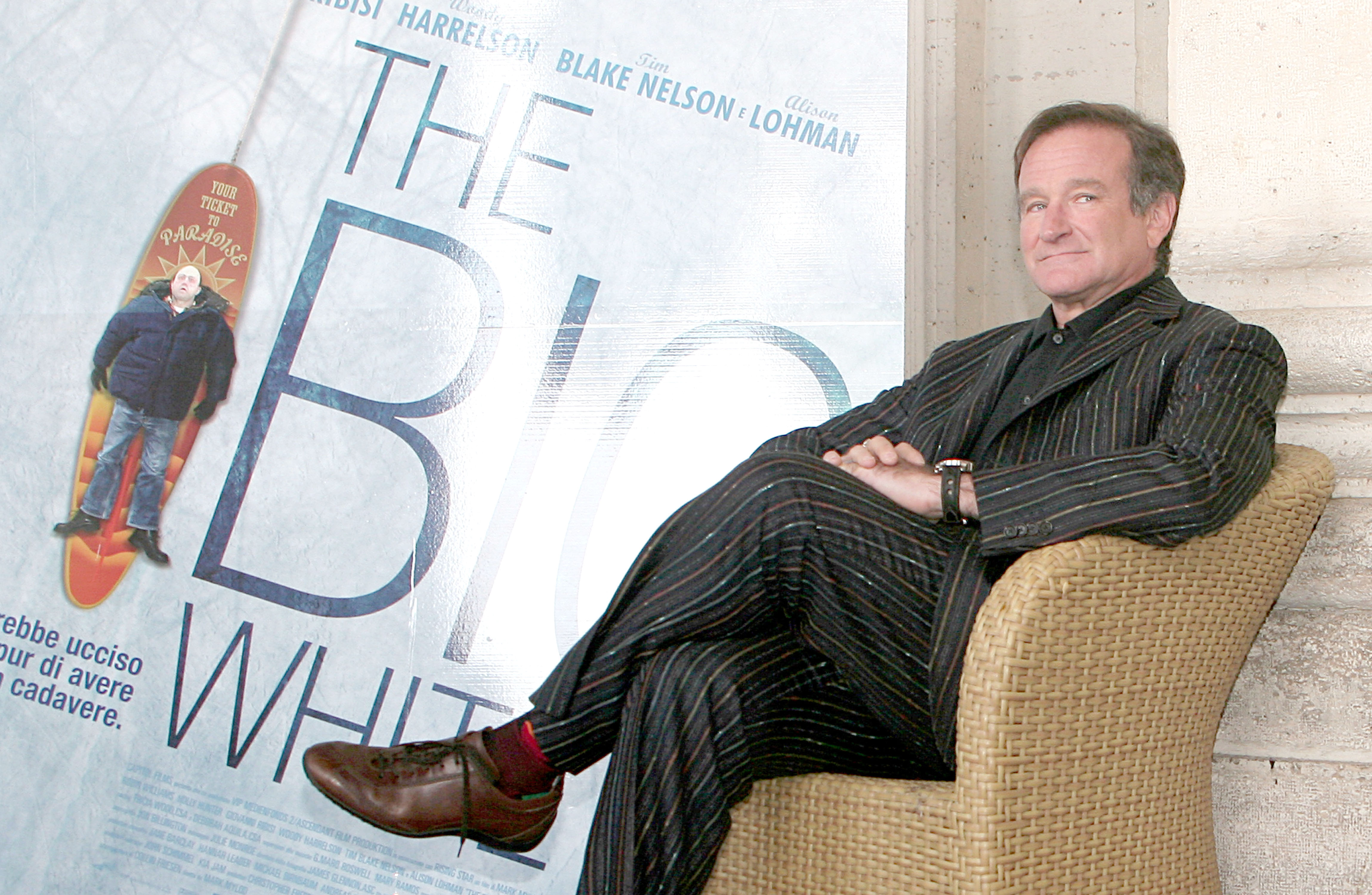
Robin Williams during a photocall on November 15, 2005, in Rome, Italy. | Source: Getty Images
When Robin asked if the man wanted to be in the photo, the man looked down, clearly self-conscious, and declined, saying, “Oh no, that’s fine… I… hehe… I’m ugly, I don’t want to ruin the picture.” Williams, sensing the man’s discomfort, responded with gentle encouragement.
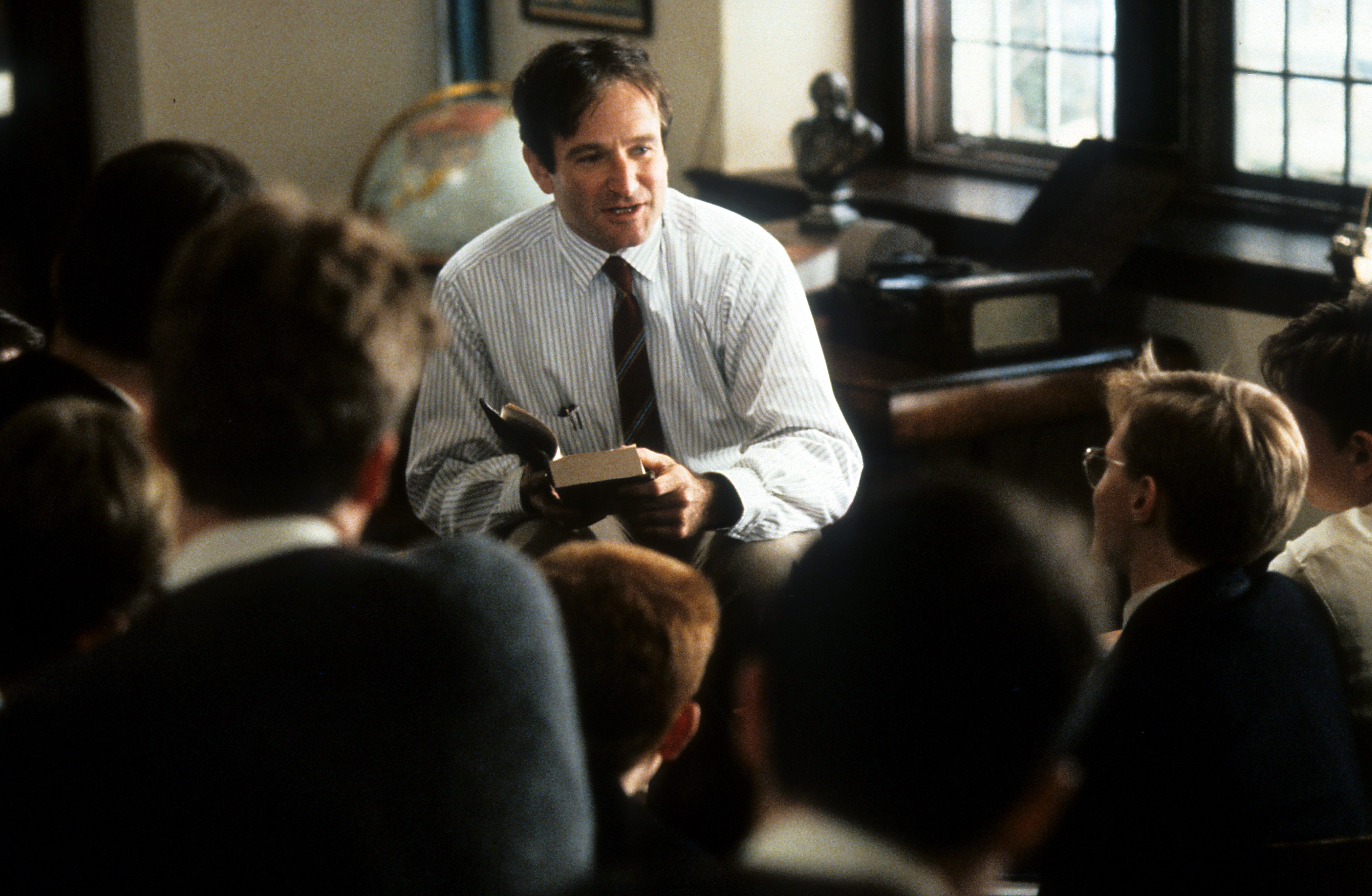
Robin Williams filming in a scene in “Dead Poets Society,” circa1989. | Source: Getty Images
“Don’t be like that, come here,” he said, inviting the man to join him for the photo. This small act of kindness left a lasting impression on the Reddit user, who was moved by the way Williams treated the fan with such innocence, kindness, and understanding.
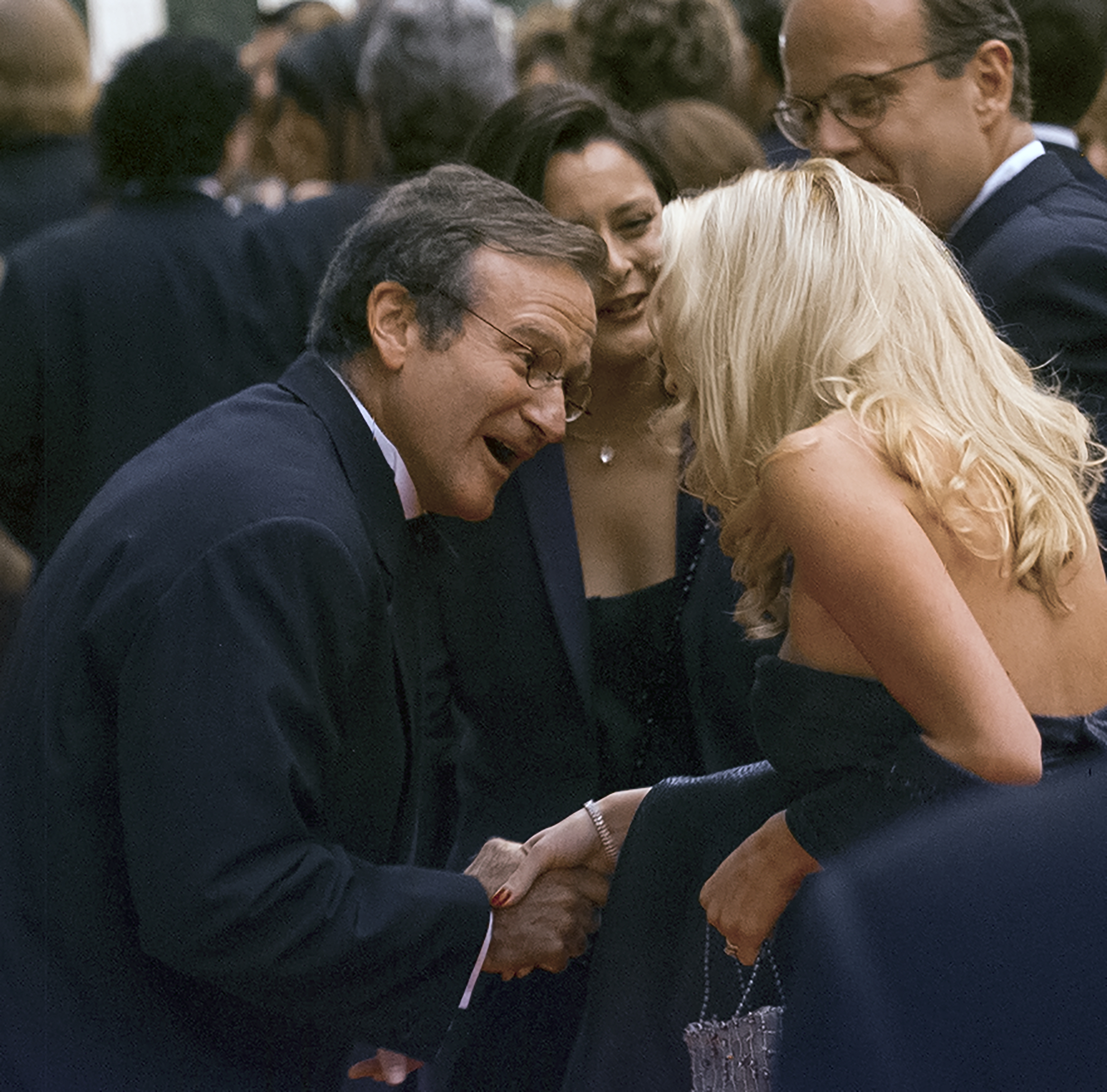
Robin Williams at the 55th Annual Golden Globes Awards Show on January 18, 1998, in Beverly Hills, California. | Source: Getty Images
Robin Williams’s Weekly Calls That Helped Steven Spielberg Cope During “Schindler’s List”
The process of filming “Schindler’s List,” a harrowing portrayal of the Holocaust, was an emotionally grueling experience for director Steven Spielberg. The weight of the subject matter took a significant toll on him.
Amidst the darkness, the legendary director found an unexpected source of relief and support in his friend, Williams, who he had worked with on the 1991 adventure film, “Hook.”
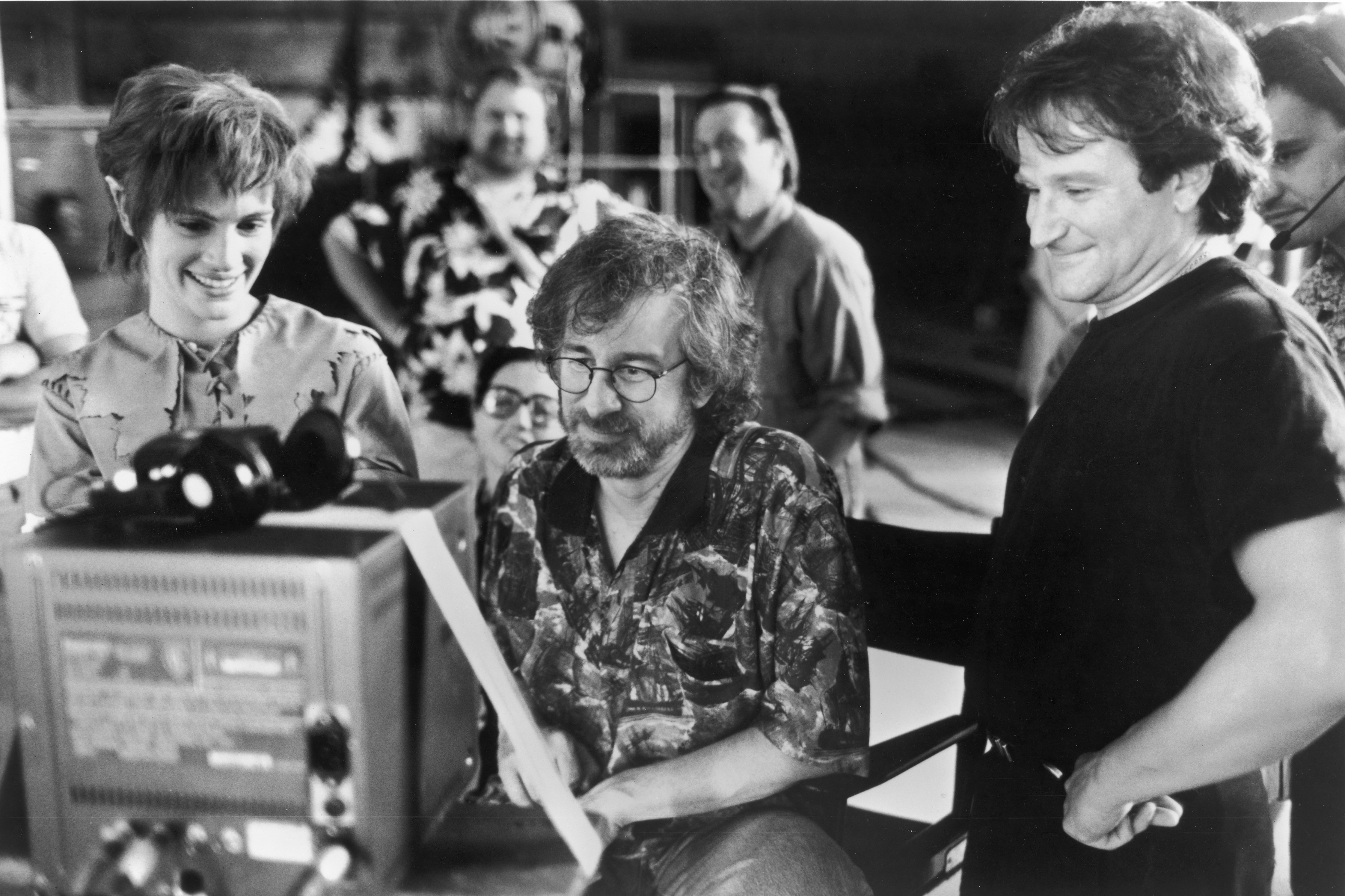
Julia Roberts, Steven Spielberg, and Robin Williams on the set of “Hook,” circa 1991. | Source: Getty Images
Spielberg, reflecting on the experience during a 25th-anniversary celebration of the film at the 2018 Tribeca Film Festival, shared how Williams played a crucial role in helping him cope with the emotional challenges of directing such a somber project.
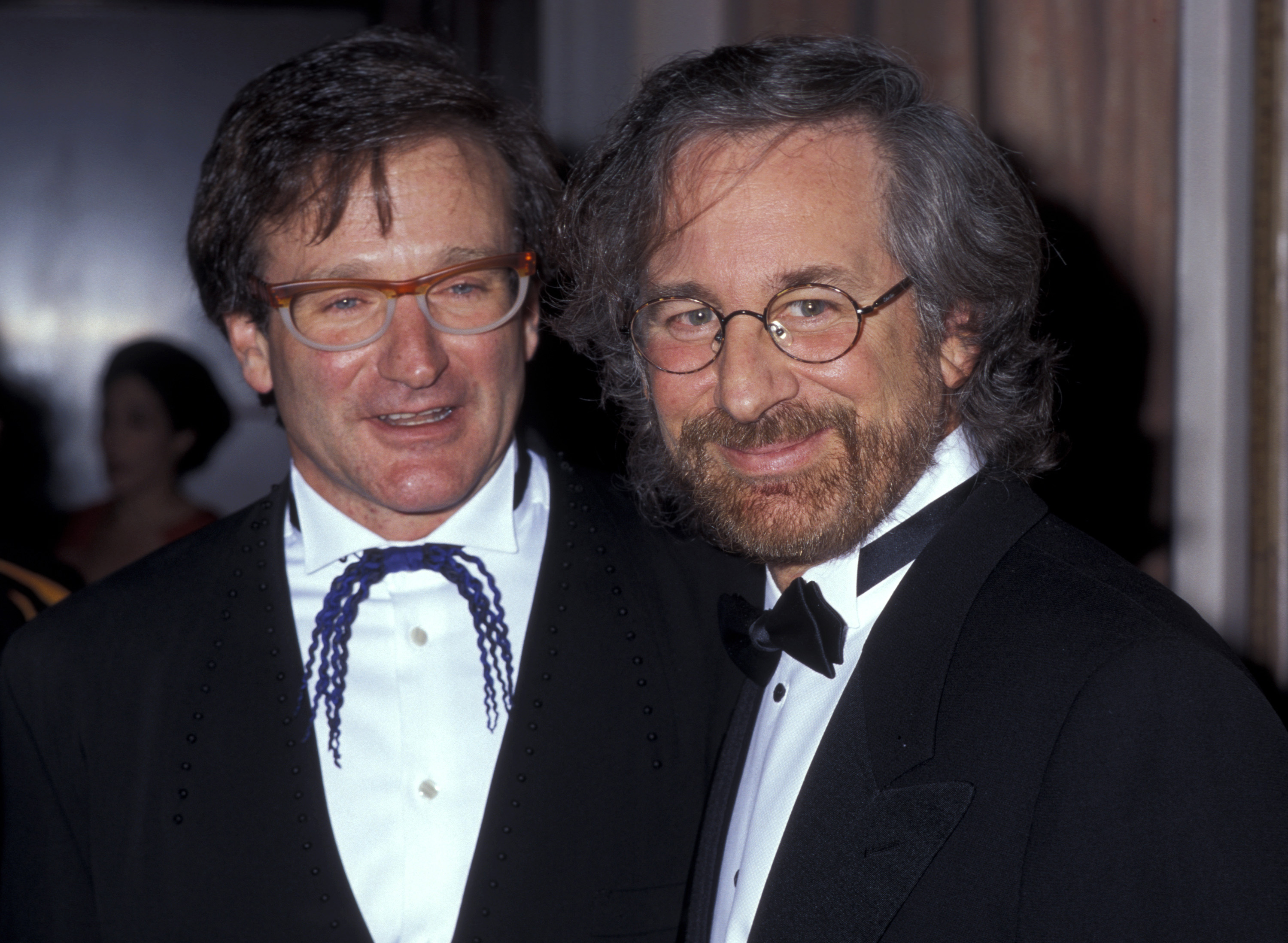
Robin Williams and Steven Spielberg at the event honoring Robin Williams hosted by the American Museum of the Moving Image in New York in 1995 | Source: Getty Images
Williams made it a point to call Spielberg every week during the filming process. These calls weren’t just casual check-ins; they were carefully timed acts of kindness meant to lift Spielberg’s spirits.
“Robin knew what I was going through, and once a week, Robin would call me on schedule and he would do 15 minutes of stand-up on the phone,” Spielberg said. For the iconic director, those weekly calls were a lifeline.
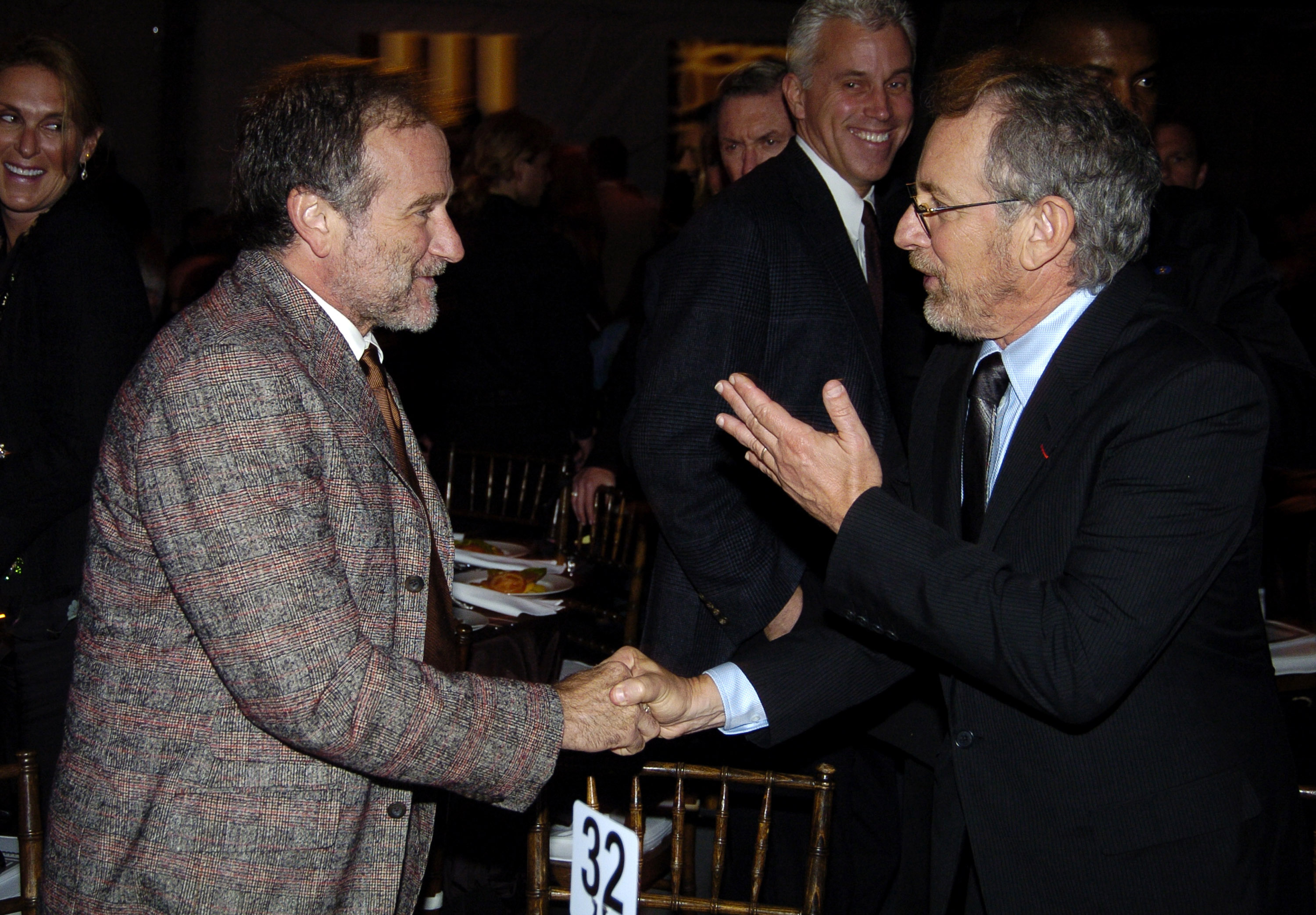
Robin Williams and Steven Spielberg at the event honoring President William Jefferson Clinton hosted by Ambassadors for Humanity in Los Angeles, California, in 2005 | Source: Getty Images
Williams would launch into a spontaneous comedy routine, delivering 15 minutes of stand-up that had Spielberg laughing hysterically. This laughter was a crucial release for Spielberg, who was carrying the heavy emotional burden of bringing such a tragic story to life on screen.
According to Spielberg, “The way Robin is on the telephone, he’d always hang up on the loudest, best laugh you’d give him. He’d never say goodbye, just hang up on the biggest laugh.”
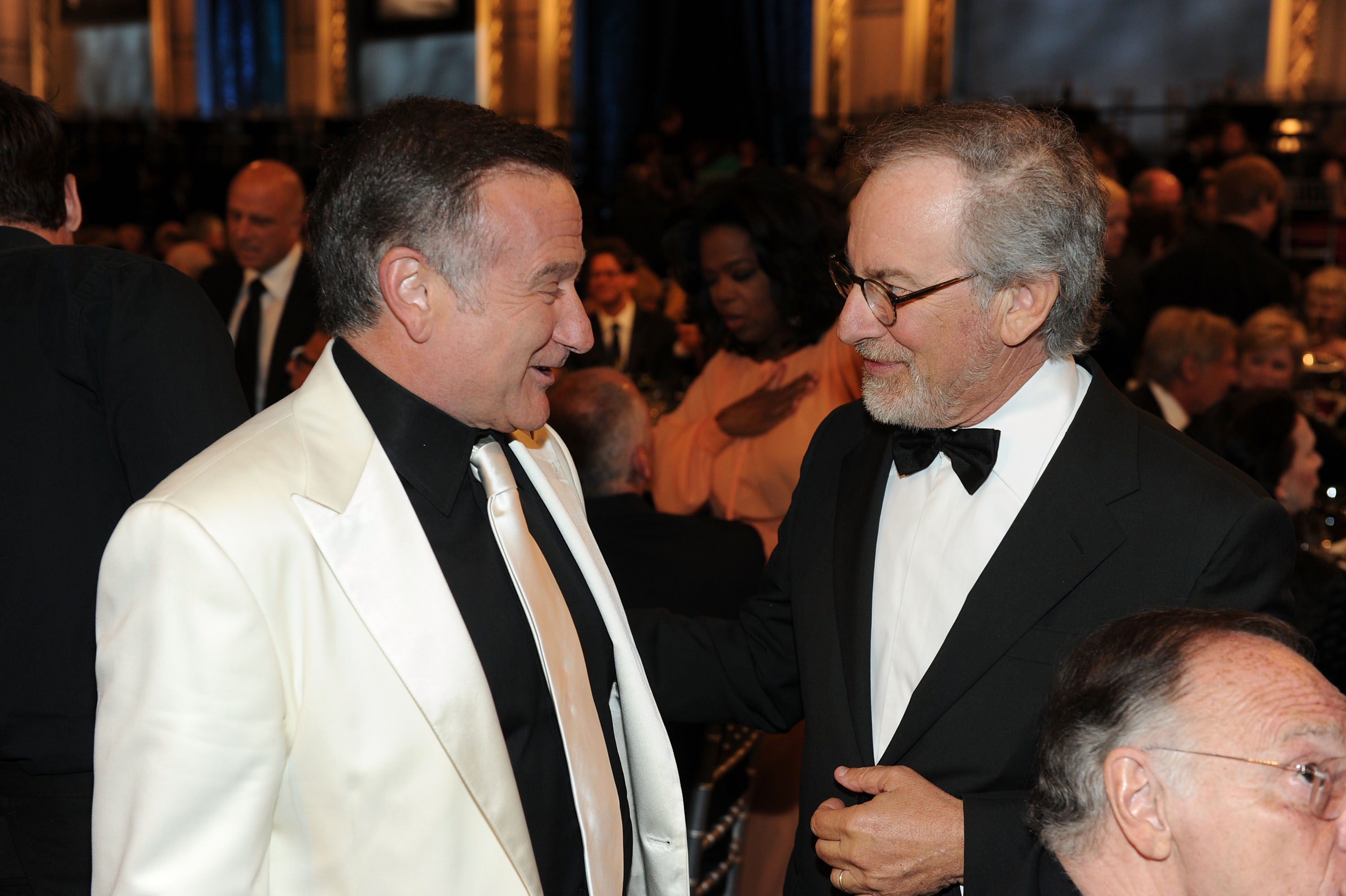
Robin Williams and Steven Spielberg during the event honoring Mike Nichols with an AFI Life Achievement Award on June 10, 2010, in Culver City, California | Source: Getty Images
Despite his vibrant public persona, Williams was quietly enduring a battle with his health that few knew about. Although he had openly struggled with depression, and drug and alcohol addiction throughout his life, the extent of his suffering only became fully known after his death.
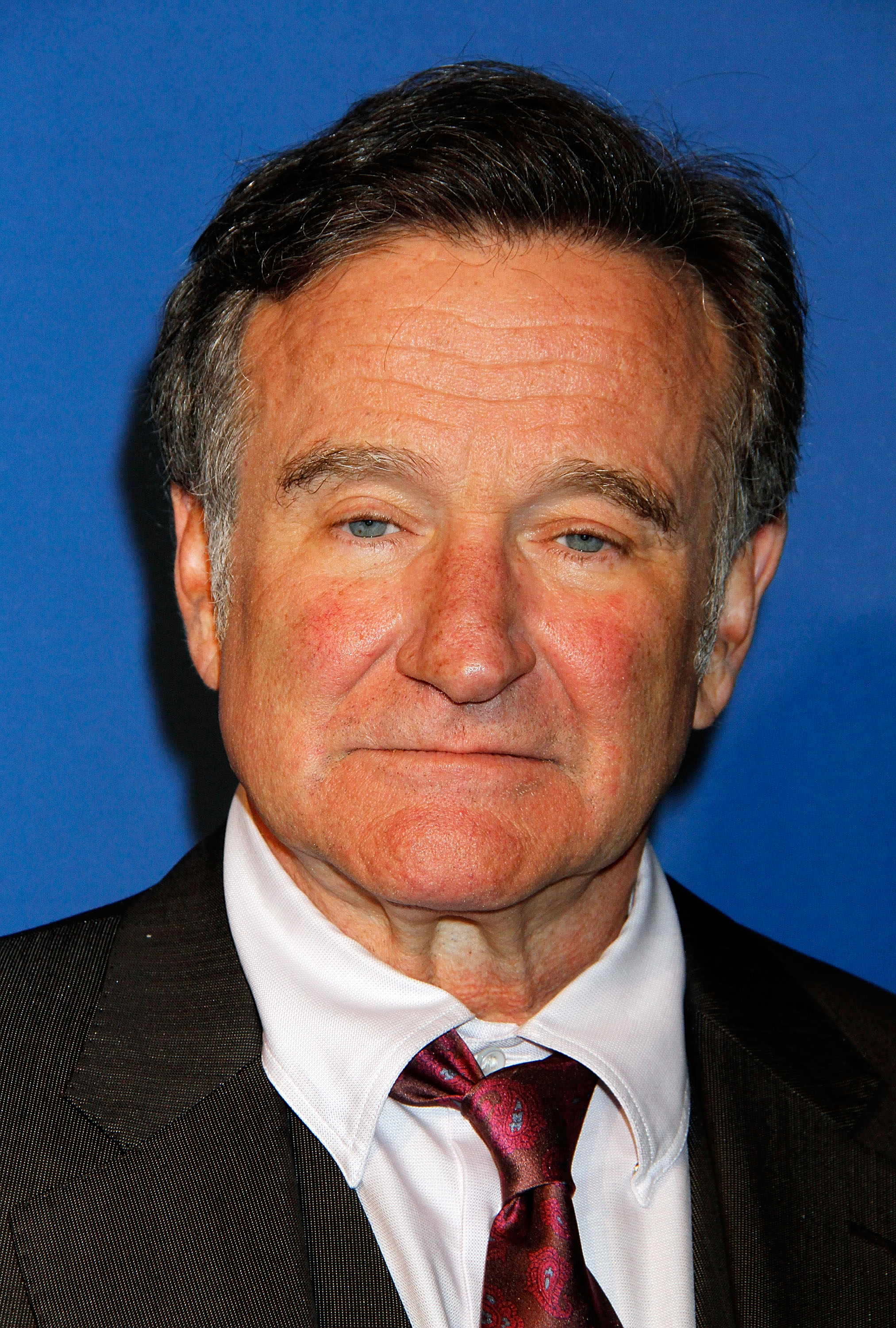
Robin Williams at the 2013 CBS Upfront event on May 15, 2013, in New York City. | Source: Getty Images
Williams was revealed to have been living with diffuse Lewy body disease (LBD), a degenerative brain condition that profoundly affected his memory and physical abilities. LBD can cause dementia and hallucinations, and while Williams was unaware of the specific condition he had, he was acutely conscious of his declining memory.
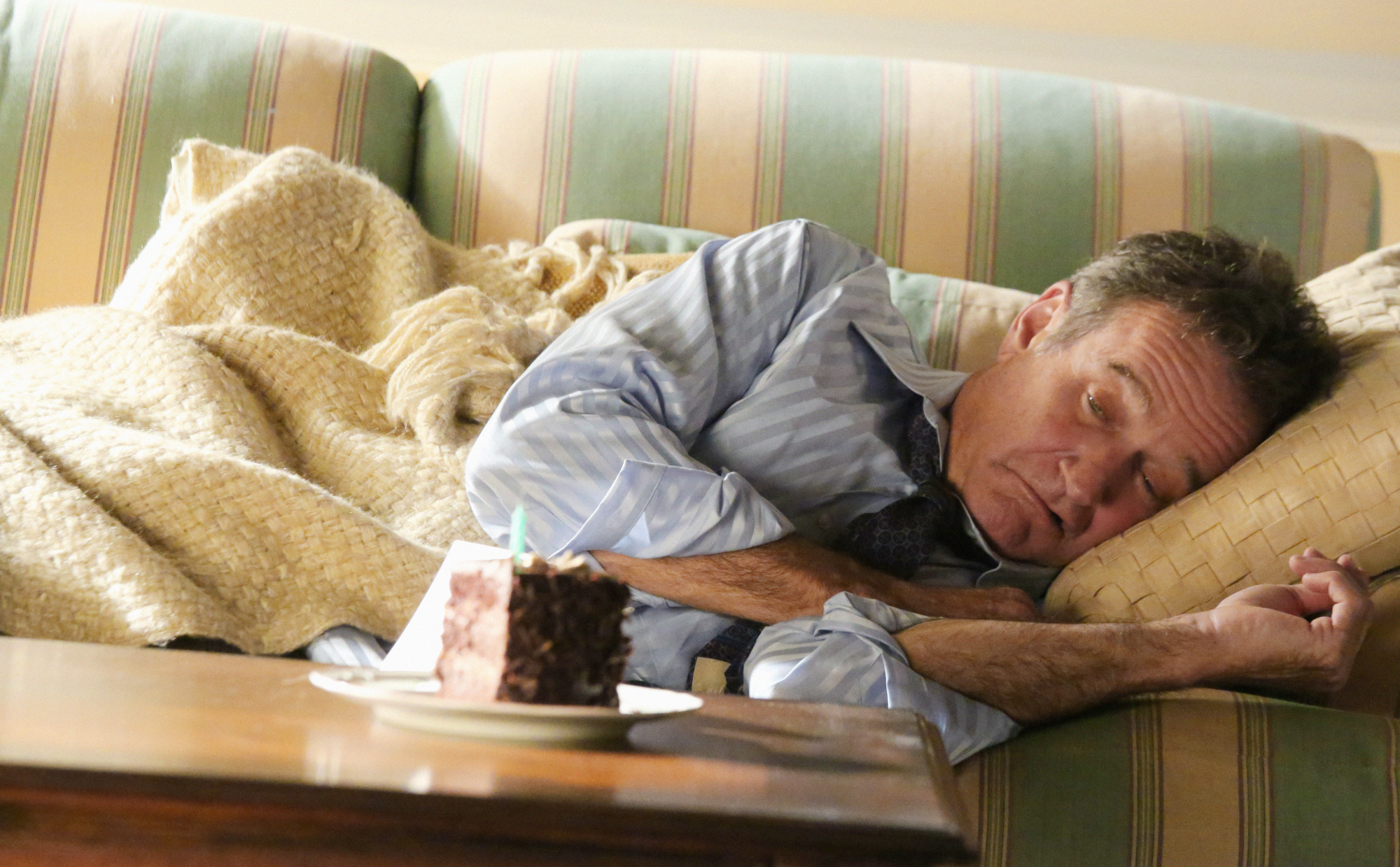
Robin Williams filming “The Crazy Ones” in 2013 | Source: Getty Images
This decline became evident while he filmed “Night at the Museum: Secret of the Tomb” in 2014, which would ultimately be his last on-screen role. Cheri Minns, a member of the film’s makeup team, recalled the distress Williams experienced during the production.
“He was sobbing in my arms at the end of every day. It was horrible. Horrible,” she shared. The makeup artist further expressed her concern, saying, “I said to his people, ‘I’m a makeup artist. I don’t have the capacity to deal with what’s happening to him.'”
In the final weeks of his life, Williams was particularly low-key. He attended an AA meeting in Mill Valley, California, in July 2014, where a local TV cameraman described him as “very low.”
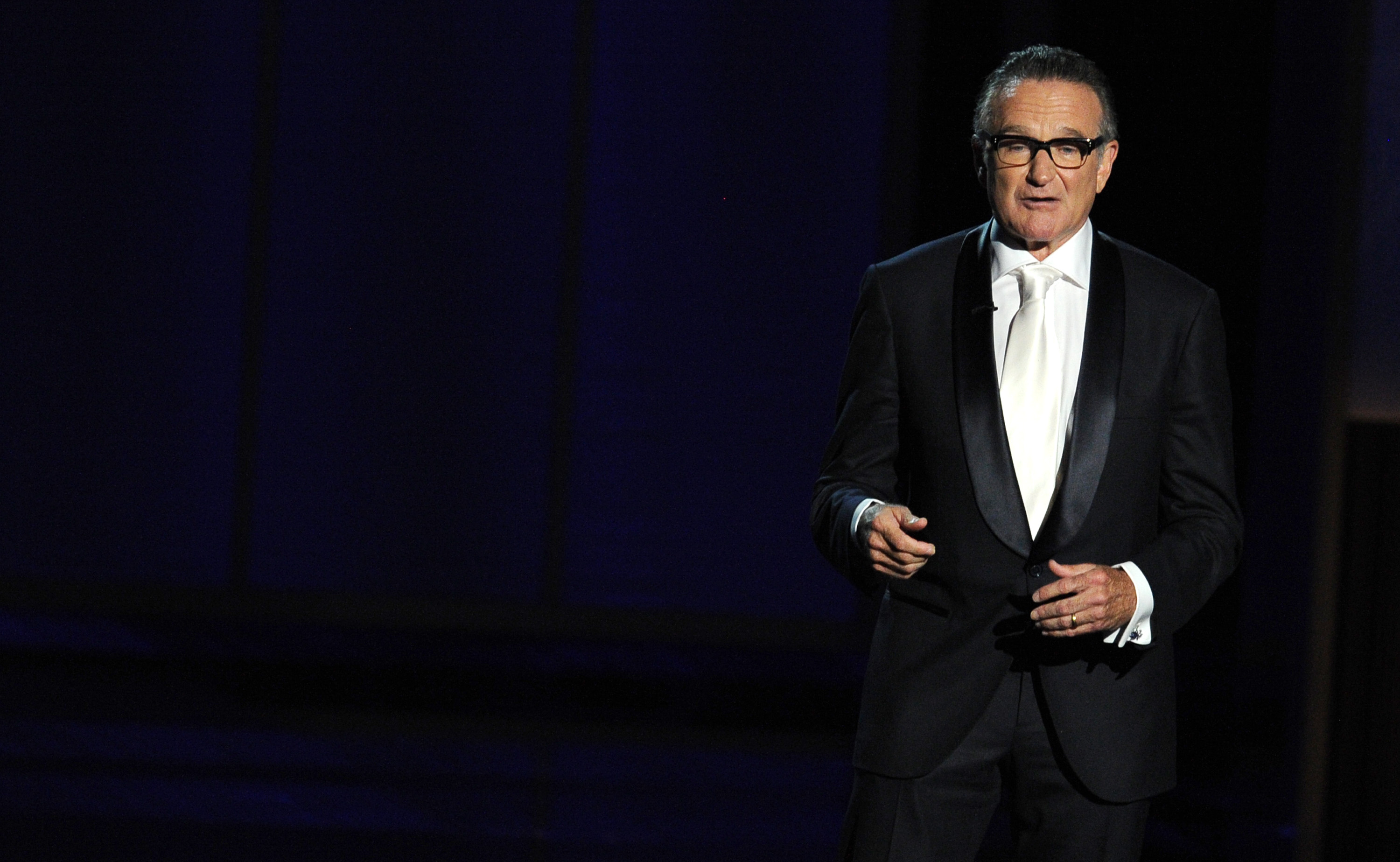
Robin Williams during the 65th Annual Primetime Emmy Awards on September 22, 2013, in Los Angeles, California. | Source: Getty Images
On August 11, 2014, the world was shocked to learn that Robin Williams had died of suicide at the age of 63. However, Williams’ legacy as a brilliant comedian and a compassionate soul remained.
